Document 1
LEX 540
FOI
From:
Christine <xxxxxxxxxxxxxxxxxxxxxxxxx@xxxxxxxxxxx.xxx.xx>
Sent:
Wednesday, 15 June 2022 12:29 PM
To:
FOI
Subject:
Freedom of Information request - Concerning revelations about APSC PID
investigation
Dear Australian Public Service Commission,
On 10 February 2022, an article was printed in The Australian. The title of the article was Top judge warned of
registrar overhaul.
According to the article:
a) “[Justice Greenwood] objected to plans to downgrade the classification that one existing registrar would be
appointed to – a decision the court’s chief executive and senior officials attempted to blame on the Australian Public
Service Commission.”
b) “Federal Court bureaucrats had circumvented the cap on the number of staff by hiring them at lower levels and
using special agreements to increase their pay – by up to $50,000 – and their titles.”
c) On 18 October 2018 Justice Greenwood wrote in an email:
i. “Warwick tells me that there is a problem because the (APSC) has a veto on any SES appointments.”
ii. “To solve the problem, Warwick wants to downgrade the role from an SES position, avoid the APSC’s veto and
appoint [Murray].”
d) “[Warwick] Soden had claimed that [Murray Belcher], a man who had been at the court for many years could not
be given the original Senior Executive Service classification advertised because it would be vetoed by the APSC
representative.”
e) Justice Greenwood noted that “Sia spoke to me briefly before she went on leave and apparently the (APSC)
representative was concerned that [Murray Belcher] was not very forthcoming about the changes to the
management system or otherwise he would make to improve the work of the court.”
1
LEX 540
f) Justice Greenwood noted “First, Warwick’s advice that the APSC has a veto on appointment is wrong.”
g) Justice Greenwood noted “The true position is that neither Warwick nor Sia want to appoint [Murray Belcher].
The so called ‘veto’ is a red herring to prevent [Murray Belcher] being awarded the position.”
h) Justice Greenwood noted that “The SES classification, you will find, will have been taken somewhere else in the
organisation …”
The issues highlighted in the article appear to have been the subject of a PID investigation that Ms Kate McMullan of
your office considered.
It appears that the following was recorded in Ms McMullan's report
(https://www.righttoknow.org.au/request/request_for_documents_relating_t#outgoing-17862):
Findings
On the balance of probabilities, I find that this assertion about the Australian Public Service Commissioner’s
representative is not substantiated. On the basis of materials provided by the FCSA including a selection report, I
find that the outcome of the recruitment process was that Mr Belcher was found by the panel (including the
Australian Public Service Commissioner’s representative on the selection panel) to be the preferred candidate for
the advertised position. On the balance of probabilities, I find that no “veto power” was exercised or purported to
be exercised by the Australian Public Service Commissioner’s representative. On the balance of probabilities I find
that Mr Belcher was appointed to a[n] [Executive Level 2] position on the basis of a role review ...
In those circumstances, it is not clear whether or for what purpose Mr Soden may have made representations that
the Australian Public Service Commissioner’s representative had exercised a “veto power”; however, in absence of a
“veto power” being exercised or being purported to be exercised, any incorrect statement by Mr Soden (whether
due to a misstatement on Mr Soden’s behalf, a misunderstanding on Justice Greenwood’s behalf, a
miscommunication between the two, or for some other reason) about action taken by the Australian Public Service
Commissioner’s representative would not in and of itself constitute disclosable conduct. On that basis, I make no
further findings about any such comments that may have been made.
That is very concerning because it looks to me like Ms McMullan set out a series of conjectures and, on the basis of
those conjectures, made "no further findings about any such comments that may have been made". It looks to me
like Ms McMullan refused to properly engage in her role as investigator under the PID Act.
2
LEX 540
I certainly do not think that Justice Greenwood misunderstood anything based on what has been published in The
Australia.
Under the FOI Act I would like access to:
a) any and al invitations to meet with Kerryn-Vine Camp for the purposes of Ms McMullan's PID investigation;
b) any and all invitations to meet with Warwick Soden for the purposes of Ms McMullan's PID investigation;
c) any and all invitations to meet with Justice Greenwood for the purposes of Ms McMullan's PID investigation;
d) any and all documents relating to the meeting with Kerryn-Vine Camp for the purposes of Ms McMullan's PID
investigation;
e) any and all documents relating to the meeting with Warwick Soden for the purposes of Ms McMullan's PID
investigation;
f) any and all documents relating to the meeting with Justice Greenwood for the purposes of Ms McMullan's PID
investigation.
Yours faithfully,
Christine
-------------------------------------------------------------------
Please use this email address for all replies to this request:
xxxxxxxxxxxxxxxxxxxxxxxxx@xxxxxxxxxxx.xxx.xx
Is xxx@xxxx.xxx.xx the wrong address for Freedom of Information requests to Australian Public Service
Commission? If so, please contact us using this form:
https://www.righttoknow.org.au/change_request/new?body=apsc
This request has been made by an individual using Right to Know. This message and any reply that you make will be
published on the internet. More information on how Right to Know works can be found at:
https://www.righttoknow.org.au/help/officers
3
LEX 540
Please note that in some cases publication of requests and responses will be delayed.
If you find this service useful as an FOI officer, please ask your web manager to link to us from your organisation's
FOI page.
-------------------------------------------------------------------
4

Document 2
LEX 540
Christine
By ema
il: xxxxxxxxxxxxxxxxxxxxxxxxx@xxxxxxxxxxx.xxx.xx
Our reference: <SHC22-29055> <LEX 189>
Dear Christine
Freedom of Information request
1. I am writing about your Freedom of Information (FOI) request under the
Freedom of
Information Act 1982 (FOI Act) made on 15 June 2022 for access to documents held by the
Australian Public Service Commission (Commission).
2. The FOI Act and all other Commonwealth legislation referred to in this letter are publicly
available from
www.legislation.gov.au
Documents relevant to your request
3. A copy of your original FOI request is attached.
Decision on your FOI request
4. I am authorised under subsection 23(1) of the FOI Act to make FOI decisions.
5. Subsection 24A(1) of the FOI Act provides that an agency may refuse a request for access
to a document if the agency is satisfied that all reasonable steps have been taken to find the
document and the agency is satisfied that the document does not exist.
6. I am satisfied that all reasonable steps have been taken to find any document relevant to
parts (a) – (f) of your request. Searches included retrieval of former employees’
correspondences from our ICT service provider, and examination of those results.
7. No documents were found. I have therefore decided to refuse your request for access under
section 24A of the FOI Act.
Contacts
8. If you require clarification on matters in this letter please contact the Commission’s FOI
Officer by telephone on (02) 6202 3500 or by email a
t xxx@xxxx.xxx.xx
Review rights
9. You are entitled to seek review of this decision. Your review rights are set out at
Attachment A.
B Block, Treasury Building
Parkes Place West PARKES ACT 2600
GPO Box 3176 CANBERRA ACT 2600

LEX 540
Yours sincerely
Giorgina Strangio
Authorised FOI decision maker
7 July 2022
LEX 540
ATTACHMENT A
Rights of Review
Asking for a full explanation of a Freedom of Information decision
If you are dissatisfied with this decision, you may seek review. Before you seek review of a
Freedom of Information (FOI) decision, you may contact us to discuss your request and we
will explain the decision to you.
Seeking review of a Freedom of Information decision
If you still believe a decision is incorrect, the
Freedom of Information Act 1982 (the FOI Act)
may give you the right to apply for a review of the decision. Under sections 54 and 54L of the
FOI Act, you can apply for a review of an FOI decision by seeking:
1. an internal review by an different officer of the Australian Public Service
Commission; and/or
2. external review by the Australian Information Commissioner.
There are no fees applied to either review option.
Applying for a review by an Internal Review Officer
If you apply for internal review, a different decision maker to the departmental delegate who
made the original decision will carry out the review. The Internal Review Officer will
consider all aspects of the original decision and decide whether it should change. An
application for internal review must be made in writing within 30 days of receiving this letter
to:
Email:
xxx@xxxx.xxx.xx
Post:
The FOI Officer
Australian Public Service Commission
B Block, Treasury Building
GPO Box 3176
Parkes Place West
PARKES ACT 2600
You do not need to fill in a form. However, it is a good idea to set out any relevant
submissions you would like the Internal Review Officer to further consider, and your reasons
for disagreeing with the decision.
Applying for external review by the Australian Information Commissioner
If you do not agree with the original FOI decision or the internal review decision, you can ask
the Australian Information Commissioner to review the decision. You have 60 days to apply
in writing for a review by the Office of the Australian Information Commissioner (the OAIC)
from the date you received this letter or any subsequent internal review decision.
LEX 540
You can
lodge your application:
Online:
www.oaic.gov.au
Post:
Australian Information Commissioner
GPO Box 5218
SYDNEY NSW 2001
Email:
xxxxxxxxx@xxxx.xxx.xx
The OAIC encourage applicants to apply online. Where possible, to assist the OAIC you
should include your contact information, a copy of the related FOI decision and provide
details of your reasons for objecting to the decision.
Complaints to the Information Commissioner and Commonwealth Ombudsman
Information Commissioner
You may complain to the Information Commissioner concerning action taken by an agency
in the exercise of powers or the performance of functions under the FOI Act. There is no fee
for making a complaint. A complaint to the Information Commissioner must be made in
writing. The Information Commissioner's contact details are:
Telephone:
1300 363 992
Website:
www.oaic.gov.au
Commonwealth Ombudsman
You may complain to the Ombudsman concerning action taken by an agency in the exercise
of powers or the performance of functions under the FOI Act. There is no fee for making a
complaint. A complaint to the Ombudsman may be made in person, by telephone or in
writing. The Ombudsman's contact details are:
Phone:
1300 362 072
Website:
www.ombudsman.gov.au
Document 3
LEX 544
FOI
From:
Marcus <xxxxxxxxxxxxxxxxxxxxxxxxx@xxxxxxxxxxx.xxx.xx>
Sent:
Wednesday, 15 June 2022 2:20 PM
To:
FOI
Subject:
Freedom of Information request - Disturbing but unsurprising revelations about
APSC PID investigation
Dear Australian Public Service Commission,
On 10 February 2022, an article was printed in The Australian. The title of the article was Top judge warned of
registrar overhaul.
According to the article:
a) “[Justice Greenwood] objected to plans to downgrade the classification that one existing registrar would be
appointed to – a decision the court’s chief executive and senior officials attempted to blame on the Australian Public
Service Commission.”
b) “Federal Court bureaucrats had circumvented the cap on the number of staff by hiring them at lower levels and
using special agreements to increase their pay – by up to $50,000 – and their titles.”
c) On 18 October 2018 Justice Greenwood wrote in an email:
i. “Warwick tells me that there is a problem because the (APSC) has a veto on any SES appointments.”
ii. “To solve the problem, Warwick wants to downgrade the role from an SES position, avoid the APSC’s veto and
appoint [Murray].”
d) “[Warwick] Soden had claimed that [Murray Belcher], a man who had been at the court for many years could not
be given the original Senior Executive Service classification advertised because it would be vetoed by the APSC
representative.”
e) Justice Greenwood noted that “Sia spoke to me briefly before she went on leave and apparently the (APSC)
representative was concerned that [Murray Belcher] was not very forthcoming about the changes to the
management system or otherwise he would make to improve the work of the court.”
1
LEX 544
f) Justice Greenwood noted “First, Warwick’s advice that the APSC has a veto on appointment is wrong.”
g) Justice Greenwood noted “The true position is that neither Warwick nor Sia want to appoint [Murray Belcher].
The so called ‘veto’ is a red herring to prevent [Murray Belcher] being awarded the position.”
h) Justice Greenwood noted that “The SES classification, you will find, will have been taken somewhere else in the
organisation …”
The issues highlighted in the article appear to have been the subject of a PID investigation that Ms Kate McMullan of
your office considered.
It appears that the following was recorded in Ms McMullan's report (https://www.righttoknow.org.au/request/r...
Findings
On the balance of probabilities, I find that this assertion about the Australian Public Service Commissioner’s
representative is not substantiated. On the basis of materials provided by the FCSA including a selection report, I
find that the outcome of the recruitment process was that Mr Belcher was found by the panel (including the
Australian Public Service Commissioner’s representative on the selection panel) to be the preferred candidate for
the advertised position. On the balance of probabilities, I find that no “veto power” was exercised or purported to
be exercised by the Australian Public Service Commissioner’s representative. On the balance of probabilities I find
that Mr Belcher was appointed to a[n] [Executive Level 2] position on the basis of a role review ...
In those circumstances, it is not clear whether or for what purpose Mr Soden may have made representations that
the Australian Public Service Commissioner’s representative had exercised a “veto power”; however, in absence of a
“veto power” being exercised or being purported to be exercised, any incorrect statement by Mr Soden (whether
due to a misstatement on Mr Soden’s behalf, a misunderstanding on Justice Greenwood’s behalf, a
miscommunication between the two, or for some other reason) about action taken by the Australian Public Service
Commissioner’s representative would not in and of itself constitute disclosable conduct. On that basis, I make no
further findings about any such comments that may have been made.
That is very concerning because it looks to me like Ms McMullan set out a series of conjectures and, on the basis of
those conjectures, made "no further findings about any such comments that may have been made". It looks to me
like Ms McMullan refused to properly engage in her role as investigator under the PID Act.
I certainly do not think that Justice Greenwood misunderstood anything based on what has been published in The
Australian.
2
LEX 544
Under the FOI Act I would like access to:
a) any and al correspondence between Kerryn Vine-Camp and Kate McMullan for the purposes of the PID
investigation Kate McMullan conducted;
b) any and all correspondence between Warwick Soden and Kate McMullan for the purposes of the PID investigation
Kate McMullan conducted;
c) any and all correspondence between Justice Greenwood and Kate McMullan for the purposes of the PID
investigation Kate McMullan conducted;
d) any and all documents exchanged between Kerryn Vine-Camp and Kate McMullan for the purposes of the PID
investigation Kate McMullan conducted;
e) any and all documents exchanged between Warwick Soden and Kate McMullan for the purposes of the PID
investigation Kate McMullan conducted;
f) any and all documents exchanged between Justice Greenwood and Kate McMullan for the purposes of the PID
investigation Kate McMullan conducted.
Yours faithfully,
Marcus
-------------------------------------------------------------------
Please use this email address for all replies to this request:
xxxxxxxxxxxxxxxxxxxxxxxxx@xxxxxxxxxxx.xxx.xx
Is xxx@xxxx.xxx.xx the wrong address for Freedom of Information requests to Australian Public Service
Commission? If so, please contact us using this form:
https://www.righttoknow.org.au/change_request/new?body=apsc
This request has been made by an individual using Right to Know. This message and any reply that you make will be
published on the internet. More information on how Right to Know works can be found at:
https://www.righttoknow.org.au/help/officers
3
LEX 544
Please note that in some cases publication of requests and responses will be delayed.
If you find this service useful as an FOI officer, please ask your web manager to link to us from your organisation's
FOI page.
-------------------------------------------------------------------
4

Document 4
LEX 544
Marcus
By ema
il: xxxxxxxxxxxxxxxxxxxxxxxxx@xxxxxxxxxxx.xxx.xx
Our reference: <SHC22-29057> <LEX 190>
Dear Marcus
Freedom of Information request
1. I am writing about your Freedom of Information (FOI) request under the
Freedom of
Information Act 1982 (FOI Act) made on 15 June 2022 for access to documents held by the
Australian Public Service Commission (Commission).
2. The FOI Act and all other Commonwealth legislation referred to in this letter are publicly
available from
www.legislation.gov.au
Documents relevant to your request
3. A copy of your original FOI request is attached.
Decision on your FOI request
4. I am authorised under subsection 23(1) of the FOI Act to make FOI decisions.
5. Subsection 24A(1) of the FOI Act provides that an agency may refuse a request for access
to a document if the agency is satisfied that all reasonable steps have been taken to find the
document and the agency is satisfied that the document does not exist.
6. I am satisfied that all reasonable steps have been taken to find any document relevant to
parts (a) – (f) of your request. Searches included retrieval of former employees’
correspondence by our ICT service provider, and examination of those results.
7. No documents were found. I have therefore decided to refuse your request for access under
section 24A of the FOI Act.
Contacts
8. If you require clarification on matters in this letter please contact the Commission’s FOI
Officer by telephone on (02) 6202 3500 or by email a
t xxx@xxxx.xxx.xx
Review rights
9. You are entitled to seek review of this decision. Your review rights are set out at
Attachment A.
B Block, Treasury Building
Parkes Place West PARKES ACT 2600
GPO Box 3176 CANBERRA ACT 2600

LEX 544
Yours sincerely
Giorgina Strangio
Authorised FOI decision maker
7 July 2022
LEX 544
ATTACHMENT A
Rights of Review
Asking for a full explanation of a Freedom of Information decision
If you are dissatisfied with this decision, you may seek review. Before you seek review of a
Freedom of Information (FOI) decision, you may contact us to discuss your request and we
will explain the decision to you.
Seeking review of a Freedom of Information decision
If you still believe a decision is incorrect, the
Freedom of Information Act 1982 (the FOI Act)
may give you the right to apply for a review of the decision. Under sections 54 and 54L of the
FOI Act, you can apply for a review of an FOI decision by seeking:
1. an internal review by an different officer of the Australian Public Service
Commission; and/or
2. external review by the Australian Information Commissioner.
There are no fees applied to either review option.
Applying for a review by an Internal Review Officer
If you apply for internal review, a different decision maker to the departmental delegate who
made the original decision will carry out the review. The Internal Review Officer will
consider all aspects of the original decision and decide whether it should change. An
application for internal review must be made in writing within 30 days of receiving this letter
to:
Email:
xxx@xxxx.xxx.xx
Post:
The FOI Officer
Australian Public Service Commission
B Block, Treasury Building
GPO Box 3176
Parkes Place West
PARKES ACT 2600
You do not need to fill in a form. However, it is a good idea to set out any relevant
submissions you would like the Internal Review Officer to further consider, and your reasons
for disagreeing with the decision.
Applying for external review by the Australian Information Commissioner
If you do not agree with the original FOI decision or the internal review decision, you can ask
the Australian Information Commissioner to review the decision. You have 60 days to apply
in writing for a review by the Office of the Australian Information Commissioner (the OAIC)
from the date you received this letter or any subsequent internal review decision.
LEX 544
You can
lodge your application:
Online:
www.oaic.gov.au
Post:
Australian Information Commissioner
GPO Box 5218
SYDNEY NSW 2001
Email:
xxxxxxxxx@xxxx.xxx.xx
The OAIC encourage applicants to apply online. Where possible, to assist the OAIC you
should include your contact information, a copy of the related FOI decision and provide
details of your reasons for objecting to the decision.
Complaints to the Information Commissioner and Commonwealth Ombudsman
Information Commissioner
You may complain to the Information Commissioner concerning action taken by an agency
in the exercise of powers or the performance of functions under the FOI Act. There is no fee
for making a complaint. A complaint to the Information Commissioner must be made in
writing. The Information Commissioner's contact details are:
Telephone:
1300 363 992
Website:
www.oaic.gov.au
Commonwealth Ombudsman
You may complain to the Ombudsman concerning action taken by an agency in the exercise
of powers or the performance of functions under the FOI Act. There is no fee for making a
complaint. A complaint to the Ombudsman may be made in person, by telephone or in
writing. The Ombudsman's contact details are:
Phone:
1300 362 072
Website:
www.ombudsman.gov.au

Document 5
LEX 545
“Alex”
By ema
il: xxxxxxxxxxxxxxxxxxxxxxxxx@xxxxxxxxxxx.xxx.xx
Our reference: <SHC22-28931><LEX187>
Dear “Alex”
Freedom of Information request
1. I am writing about your Freedom of Information (FOI) request under the
Freedom of
Information Act 1982 (FOI Act) made on 12 June 2022 for access to documents held by
the Australian Public Service Commission (Commission).
2. The FOI Act and all other Commonwealth legislation referred to in this letter are publicly
available from
www.legislation.gov.au
Documents relevant to your request
3. Your full request is enclosed.
4. I have identified two documents relevant to your request.
Decision
5. I am authorised under subsection 23(1) of the FOI Act to make FOI decisions.
6. For each part of your request I have decided:
Part 1
All reasonable steps have been taken to find any document relevant to Part 1 of
your request. I am satisfied that the documents either cannot be found or do not
exist. I refuse Part 1 of your request under section 24A of the FOI Act.
Part 2
All reasonable steps have been taken to find any document relevant to Part 2 of
your request. I am satisfied that the documents either cannot be found or do not
exist. I refuse Part 2 of your request under section 24A of the FOI Act.
Part 3
I have decided to refuse access to two documents (Documents 1 and 2) because
I consider they are exempt in full.
Attachment A sets out the grounds on which
the documents are exempt. My reasons are set out in
Attachment B.
B Block, Treasury Building
Parkes Place West PARKES ACT 2600
GPO Box 3176 CANBERRA ACT 2600
LEX 545
Part 4
All reasonable steps have been taken to find any document relevant to Part 4 of
your request. I am satisfied that the documents either cannot be found or do not
exist. I refuse Part 4 of your request under section 24A of the FOI Act.
Part 5
All reasonable steps have been taken to find any document relevant to Part 5 of
your request. I am satisfied that the documents either cannot be found or do not
exist. I refuse Part 5 of your request under section 24A of the FOI Act.
Part 6
All reasonable steps have been taken to find any document relevant to Part 6 of
your request. I am satisfied that the documents either cannot be found or do not
exist. I refuse Part 6 of your request under section 24A of the FOI Act.
Part 7 All reasonable steps have been taken to find any document relevant to Part 7
of your request. I am satisfied that the documents not exist. I refuse Part 7 of
your request under section 24A of the FOI Act.
Part 8 All reasonable steps have been taken to find any document relevant to Part 8
of your request. I am satisfied that the documents not exist. I refuse Part 8 of
your request under section 24A of the FOI Act.
Part 9
All reasonable steps have been taken to find any document relevant to Part 9
of your request. I am satisfied that the documents not exist. I refuse Part 9 of
your request under section 24A of the FOI Act.
Part
All reasonable steps have been taken to find any document relevant to Part 10
10
of your request. I am satisfied that the documents not exist. I refuse Part 10 of
your request under section 24A of the FOI Act.
Part
All reasonable steps have been taken to find any document relevant to Part 11
11
of your request. I am satisfied that the documents not exist. I refuse Part 11 of
your request under section 24A of the FOI Act.
Part
All reasonable steps have been taken to find any document relevant to Part 12
12
of your request. I am satisfied that the documents not exist. I refuse Part 12 of
your request under section 24A of the FOI Act.
Part
All reasonable steps have been taken to find any document relevant to Part 13
13
of your request. I am satisfied that the documents not exist. I refuse Part 13 of
your request under section 24A of the FOI Act.
Part
All reasonable steps have been taken to find any document relevant to Part 14
14
of your request. I am satisfied that the documents not exist. I refuse Part 14 of
your request under section 24A of the FOI Act.
Part
I have decided to refuse access to one document (Document 2) because I
15
consider it is exempt in full.
Attachment A sets out the grounds on which I
consider the document is exempt. My reasons are set out in
Attachment B.
Deletion of exempt matter or irrelevant material
7. Section 22 of the FOI Act requires an agency to provide access to an edited version of a
document where it is reasonably practicable to edit the document to remove exempt
material or material that is irrelevant to the scope of a request.

LEX 545
8. Relevant to deleting exempt or irrelevant content from a document, the FOI Guidelines
provide:
“3.98
Applying those considerations, an agency or minister should take a common sense
approach in considering whether the number of deletions would be so many that the
remaining document would be of little or no value to the applicant. Similarly, the purpose
of providing access to government information under the FOI Act may not be served if
extensive editing is required that leaves only a skeleton of the former document that conveys
little of its content or substance.”
9. I consider the objects of the FOI Act will not be served by providing access to an edited
version of the documents because extensive editing is required that would leave only a
skeleton of the former documents, conveying little content or substance.
Contacts
10. If you require clarification on matters in this letter please contact the Commission’s FOI
Officer by telephone on (02) 6202 3500 or by email a
t xxx@xxxx.xxx.xx
Review rights
11. You are entitled to seek review of this decision. Your review rights are set out at
Attachment C.
Yours sincerely
Giorgina Strangio
Authorised FOI decision maker
4 July 2022
LEX 545
ATTACHMENT A
SCHEDULE OF DOCUMENTS
D
ocument
Description
Grounds
Sections 22 (editing), 47C
(deliberative matter), 47E(c) and
1
Email correspondence between Commission and Federal Court of Australia titled 47E(d) (operations of an agency), and
“PRIVATE AND CONFIDENTIAL” dated 27 October 2020
47F (personal privacy) of the FOI Act
apply.
Sections 22 (editing and irrelevance),
Judicial Registrar Recruitment Outcome document prepared by Federal Court of
47C (deliberative matter), 47E(c) and
2
Australia
47E(d) (operations of an agency), and
47F (personal privacy) of the FOI Act
apply.
LEX 545
ATTACHMENT B
Reasons for decision
1. I have decided to refuse access to the documents in full because I have determined the
documents are exempt in full.
2. In making my decision I considered:
• the terms of your request;
• the contents of the document;
• the
Public Interest Disclosure Act 2013 (PID Act);
• the
Public Service Act 1999 (PS Act);
• the
Ombudsman Act 1976 (Ombudsman Act);
• the FOI Act;
• legal advice; and
• the FOI Guidelines issued by the Australian Information Commissioner.
Section 47C – Documents subject to deliberative processes
3. Section 47C of the FOI Act conditionally exempts documents containing deliberative
matter. Deliberative matter generally consists of:
• an opinion, advice or recommendation that has been obtained, prepared or recorded; or
• a deliberative process of the Commission.
4. A deliberative process includes the recording or exchange of opinions, advice,
recommendations, a collection of facts or opinions and interim decisions and deliberations.
5. The documents that fall within the scope of your request contain material which record the
deliberative processes of the Commission and the Federal Court of Australia. This
deliberative material relates to how the PID investigation was conducted by the
Commission, and contains material prepared or recorded as part of the deliberative PID
process.
6. For the reasons outlined above I am of the view that the documents contain deliberative
matter and parts are therefore conditionally exempt under section 47C of the FOI Act.
Sections 47E(c) and 47E(d) FOI Act – Certain operations of agencies
7. Sections 47E(c) and 47E(d) of the FOI Act provide that a document is conditionally
exempt from disclosure if its disclosure would, or could be reasonably expected to, have a
substantial adverse effect on the management or assessment of personnel by an agency, or
on the proper and efficient conduct of the operations of an agency.
8. The Australian Public Service Commissioner (Commissioner) and his delegates have a
number of inquiry functions under the PS Act, including in relation to the investigation of
certain public interest disclosures under the PID Act.
9. It is important that the Commissioner and his delegates are able to properly undertake
activities under the PID Act. The PID scheme promotes integrity and accountability
LEX 545
- 6 -
across the Commonwealth public sector and provides a protected space for all current and
former public officials (‘disclosers’) to make disclosures relating to suspected
wrongdoing or misconduct.
10. I have considered that under the PID scheme information collected during the course of a
PID investigation is protected under section 65 of the PID Act.
11. I have decided that release of material contained within the documents under the FOI Act
would likely undermine the protections provided under the PID scheme, and likely
discourage current and former public officials to make PID disclosures or to involve
themselves in PID investigations. The success of any PID investigation process relies
heavily on the willingness of individuals to participate in the PID scheme in a frank and
candid manner.
12. Further, I consider that the release of the documents would also likely have a larger effect
of inhibiting or discouraging Commission staff to freely and effectively communicate on
matters relating to the PID Act, including in the consideration and assessment of material
subject to a PID investigation. Should individuals be unwilling or unable to effectively
participate in the PID scheme, this would ultimately have a substantial adverse effect on
the Commission’s ability to carry out its obligations under the PID Act, including its
ability to ensure that allegations of misconduct are being investigated and where
necessary take appropriate action in a proper and efficient manner.
13. I note that the importance of protecting information collected during a PID investigation
process was upheld in the recent Information Commissioner (IC) decision of ‘
YU’ and
Bureau of Meteorology (Freedom of Information) [2021] AICmr75 (29 November 2021),
where the IC accepted the relevant department’s submissions that certain operations of
the agency could be undermined if the confidentiality established under the PID Act was
circumvented by an access application made under the FOI Act.
14. I consider release of the information in the document would jeopardise the confidentiality
regime established by the
Public Interest Disclosure Act 2013. There is no legislative or
regulatory regime that requires the disclosure of the document requested. Rather, disclosure
of the information would likely breach the Commission’s privacy and confidentiality
obligations under the Commonwealth Public Interest Disclosure scheme.
15. Further, the documents are documents being considered in a Commonwealth Ombudsman
(Ombudsman) investigation which is current, ongoing and unfinalised. The Ombudsman
initially made a preliminary inquiry about the matter, and subsequently decided to
commence the investigation.
16. I consider disclosure of documents would have a substantial adverse effect on the ability
of the Ombudsman to obtain information for its investigations, which are undertaken in
private in accordance with section 8 of the Ombudsman Act and the confidentiality
provisions set out in section 35 of the Ombudsman Act. These provisions require and
protect the confidentiality of information held by the Ombudsman in relation to
Ombudsman investigations.
17. I also consider disclosure of the documents would have the following substantial adverse
effects on the Ombudsman’s operations:
LEX 545
- 7 -
• Disclosure would discourage complainants from contacting the Ombudsman out of
concern that it is not possible to keep relevant investigation information confidential.
Where the requested document relates to an open complaint concerning an ongoing
investigation, disclosure is likely to undermine effective oversight by the
Ombudsman.
• Disclosure of the relevant document would discourage agencies or members of the
public from providing information to the Ombudsman’s office in relation to an
investigation. The likely effect of this would be to impede the Ombudsman’s ability to
conduct thorough, efficient investigations availed of all relevant facts and
information.
18. I have therefore decided disclosure of information relating to allegations, inquiries and
investigations under the PID scheme and under the Ombudsman Act would, or could
reasonably be expected to, have a substantial adverse effect on the management or
assessment of public servants and on the proper and efficient conduct of the operations of
the Commission and the Ombudsman.
Section 47F – personal information
19. Section 47F of the FOI Act provides that a document is conditionally exempt if it would
involve the unreasonable disclosure of personal information about any person.
20. Personal information means information or an opinion about an identified individual, or an
individual who is reasonably identifiable whether:
• the information or opinion is true or not; and
• the information or opinion is recorded in a material form or not.
21. The document contains the names and other personal information of public servants and
other individuals, including information about their qualifications and employment
history.
22. I have had regard to the matters I must consider under subsection 47F(2) of the FOI Act in
determining whether the disclosure of the documents would involve the unreasonable
disclosure of personal information.
23. Relevant to personal information of public servants, under the FOI Act there is no
presumption that agencies and ministers should start from the position that the inclusion of
the full names of staff in documents increases transparency and the objects of the FOI Act:
Warren; Chief Executive Officer, Services Australia and (Freedom of information) [2020]
AATA 4557 at [83].
24. With the substantial increase in electronic requests and related correspondence, a rise in
anonymous applications as well as requests affecting the safety and wellbeing of
employees, the Commission assesses whether a disclosure of public servants’ personal
information in requests is unreasonable under section 47F of the FOI Act.
LEX 545
- 8 -
25. I have identified the following factors that, in my view, do not support release of certain
public servants’ personal information under section 47F of the FOI Act:
• the individuals’ personal information, in particular their names, will or may identify
them;
• the individuals’ are generally not well or widely known to be associated with the
relevant matter;
• some of the personal information is qualitative assessments of public servants or other
individuals which is extremely personal and sensitive;
• the release of some of the individuals’ personal information may cause stress for them
or other detriment; and
• disclosure would prejudice the individuals’ right to privacy.
26. The level of personal information published in media articles by
The Australian and on the
Right to Know website may cause the concerned persons harm and distress. Due to the
level of attention brought about by the articles disclosure of any personal information could
reasonably be expected to interfere with the privacy of individuals. It follows I consider it
would be unreasonable to disclose the personal information in the document given it is
highly likely to lead to further harm and distress for those people and others.
27. I have therefore decided to the extent that the documents include personal information,
those parts are conditionally exempt from disclosure under section 47F of the FOI Act
because disclosure would involve the unreasonable disclosure of multiple persons’ personal
information.
Section 11A – public interest test
28. Subsection 11A(5) of the FOI Act provides that an agency must give access to a document
if it is conditionally exempt unless access to the document would, on balance, be contrary
to the public interest.
29. I have considered the public interest exemption factors in favour of disclosure at subsection
11B(3) of the FOI Act, including the extent to which access to the document would promote
the objects of the FOI Act and inform debate on a matter of public importance.
30. I have identified the following factors as weighing against disclosure:
• disclosure of certain personal information will not advance any scrutiny of any
decisions falling within the scope of your FOI request;
• disclosure would prejudice the individuals’ right to privacy;
• APS employers must fulfil their obligations under the
Work Health and Safety Act 2011,
in particular by preventing the exposure of staff members from potential harassment or
threats in a public forum;
• disclosure would undermine the confidentiality and secrecy provisions fundamental to
the PID Scheme;
• the disclosure of the Commission’s deliberative processes will hinder the
Commission’s future deliberative processes and efficiency with which the Commission
can support the functions of the Commissioner;
• the disclosure of certain information have a substantial adverse effect on the proper and
efficient conduct of the operations of the Commission;
LEX 545
- 9 -
• disclosure may undermine the Commission’s relationship with agencies and third party
individuals;
• disclosure could reasonably be expected to prejudice the conduct of investigations,
audits or reviews by the Ombudsman or Auditor-General, noting in particular that the
documents are being considered in an open investigation and its disclosure may
adversely affect the ability of the Ombudsman to finalise the matter; and
• disclosure would be inconsistent with relevant provisions of the Ombudsman Act
relating to confidentiality and could reasonably be expected to prejudice the
Ombudsman’s ability to obtain confidential information in the future.
31. Subsection 11B(4) of the FOI Act lists factors that are irrelevant to determining whether
access would be in the public interest. I have not considered these factors.
32. The oversight of the Commonwealth Public Interest Disclosure scheme is a responsibility
of the Commonwealth Ombudsman. I do not consider the information in the documents
would be of serious concern or benefit to the public. In my view, it would merely satisfy
the curiosity of others, which is not a consideration of the public interest test.
33. On balance, I find disclosure of parts of the documents would be contrary to the public
interest. To the extent the material contained in the documents is conditionally exempt
under 47C, 47E and 47F of the FOI Act, the material is exempt from disclosure in full.
LEX 545
Rights of Review
Asking for a full explanation of a Freedom of Information decision
If you are dissatisfied with this decision, you may seek review. Before you seek review of a
Freedom of Information (FOI) decision, you may contact us to discuss your request and we
will explain the decision to you.
Seeking review of a Freedom of Information decision
If you still believe a decision is incorrect, the
Freedom of Information Act 1982 (the FOI Act)
you may be able to apply for a review of the decision. Under sections 54 and 54L of the FOI
Act, you can apply for a review of an FOI decision by seeking:
1. an internal review by an different officer of the Australian Public Service
Commission; and/or
2. external review by the Australian Information Commissioner.
There are no fees applied to either review option.
Applying for a review by an Internal Review Officer
If you apply for internal review, a different decision maker to the departmental delegate who
made the original decision will carry out the review. The Internal Review Officer will
consider all aspects of the original decision and decide whether it should change. An
application for internal review must be made in writing within 30 days of receiving this letter
to:
Email:
xxx@xxxx.xxx.xx
Post:
The FOI Officer
Australian Public Service Commission
B Block, Treasury Building
GPO Box 3176
Parkes Place West
PARKES ACT 2600
You do not need to fill in a form. However, it is a good idea to set out any relevant
submissions you would like the Internal Review Officer to further consider, and your reasons
for disagreeing with the decision.
Applying for external review by the Australian Information Commissioner
If you do not agree with the original FOI decision or the internal review decision, you can ask
the Australian Information Commissioner to review the decision. You have 60 days to apply
in writing for a review by the Office of the Australian Information Commissioner (the OAIC)
from the date you received this letter or any subsequent internal review decision.
You can
lodge your application:
LEX 545
Online:
www.oaic.gov.au
Post:
Australian Information Commissioner
GPO Box 5218
SYDNEY NSW 2001
Email:
xxxxxxxxx@xxxx.xxx.xx
The OAIC encourage applicants to apply online. Where possible, to assist the OAIC you
should include your contact information, a copy of the related FOI decision and provide
details of your reasons for objecting to the decision.
Complaints to the Information Commissioner and Commonwealth Ombudsman
Information Commissioner
You may complain to the Information Commissioner concerning action taken by an agency
in the exercise of powers or the performance of functions under the FOI Act. There is no fee
for making a complaint. A complaint to the Information Commissioner must be made in
writing. The Information Commissioner's contact details are:
Telephone:
1300 363 992
Website:
www.oaic.gov.au
Commonwealth Ombudsman
You may complain to the Ombudsman concerning action taken by an agency in the exercise
of powers or the performance of functions under the FOI Act. There is no fee for making a
complaint. A complaint to the Ombudsman may be made in person, by telephone or in
writing. The Ombudsman's contact details are:
Phone:
1300 362 072
Website:
www.ombudsman.gov.au
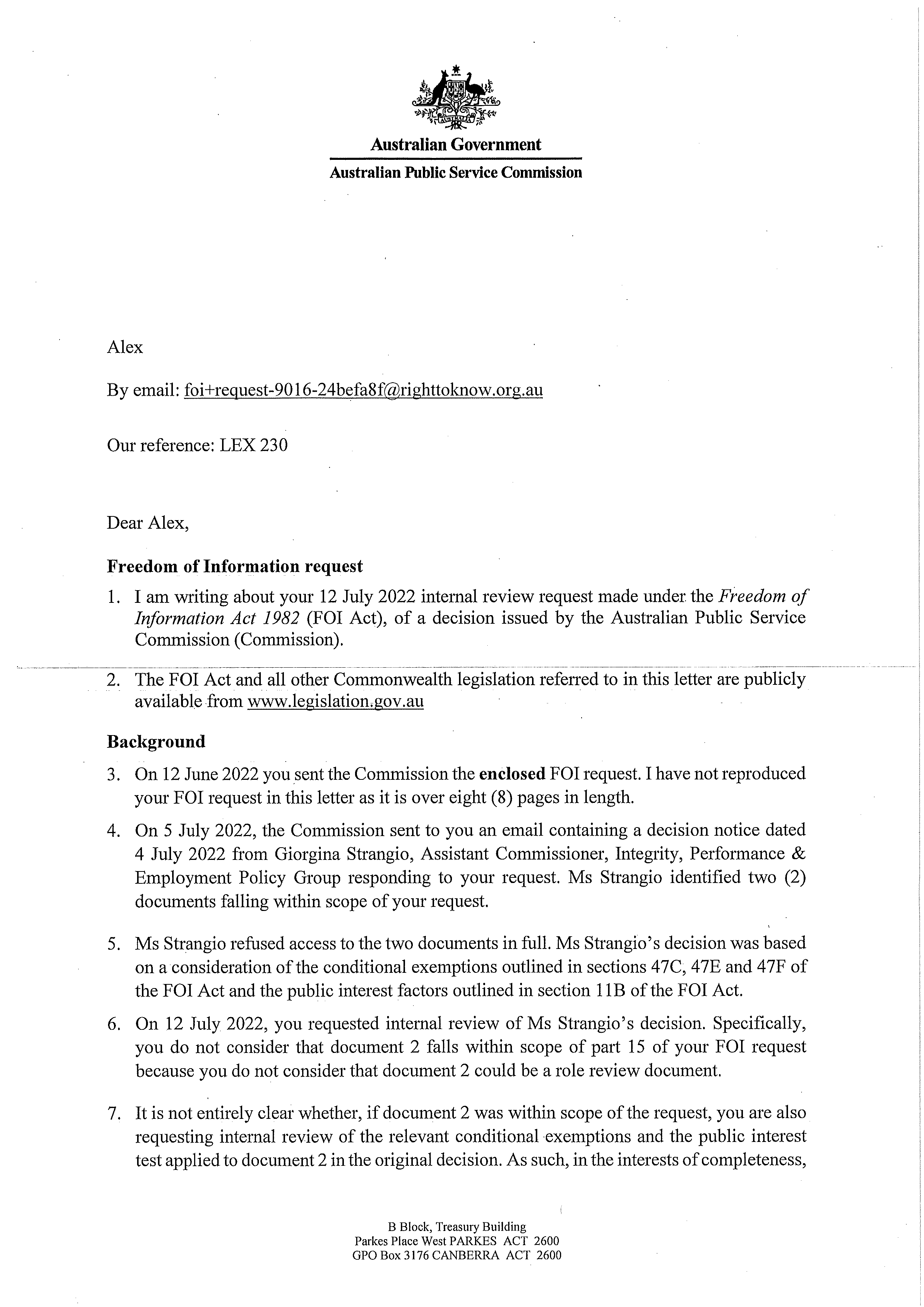
LEX 545
Document 6
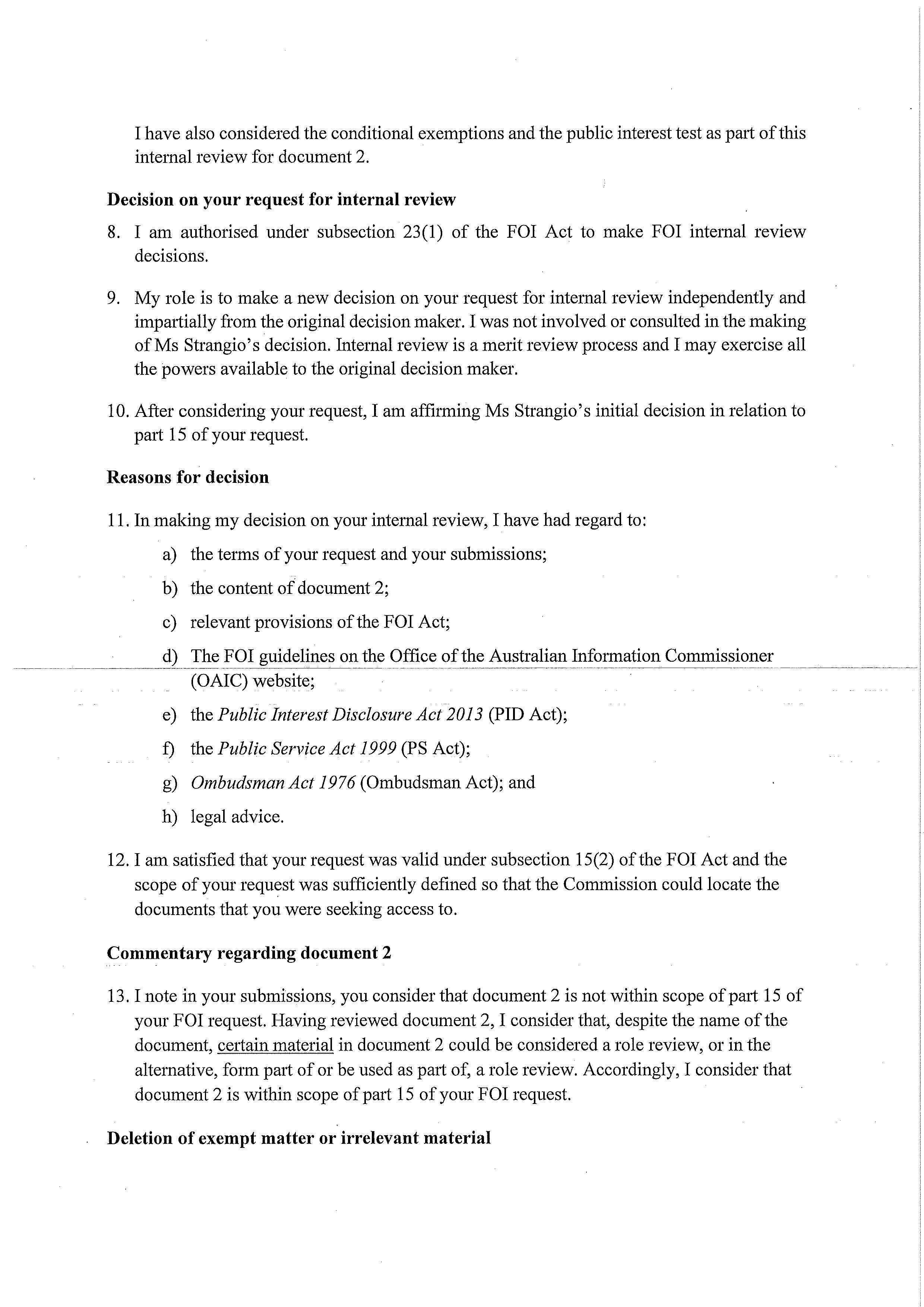
LEX 545
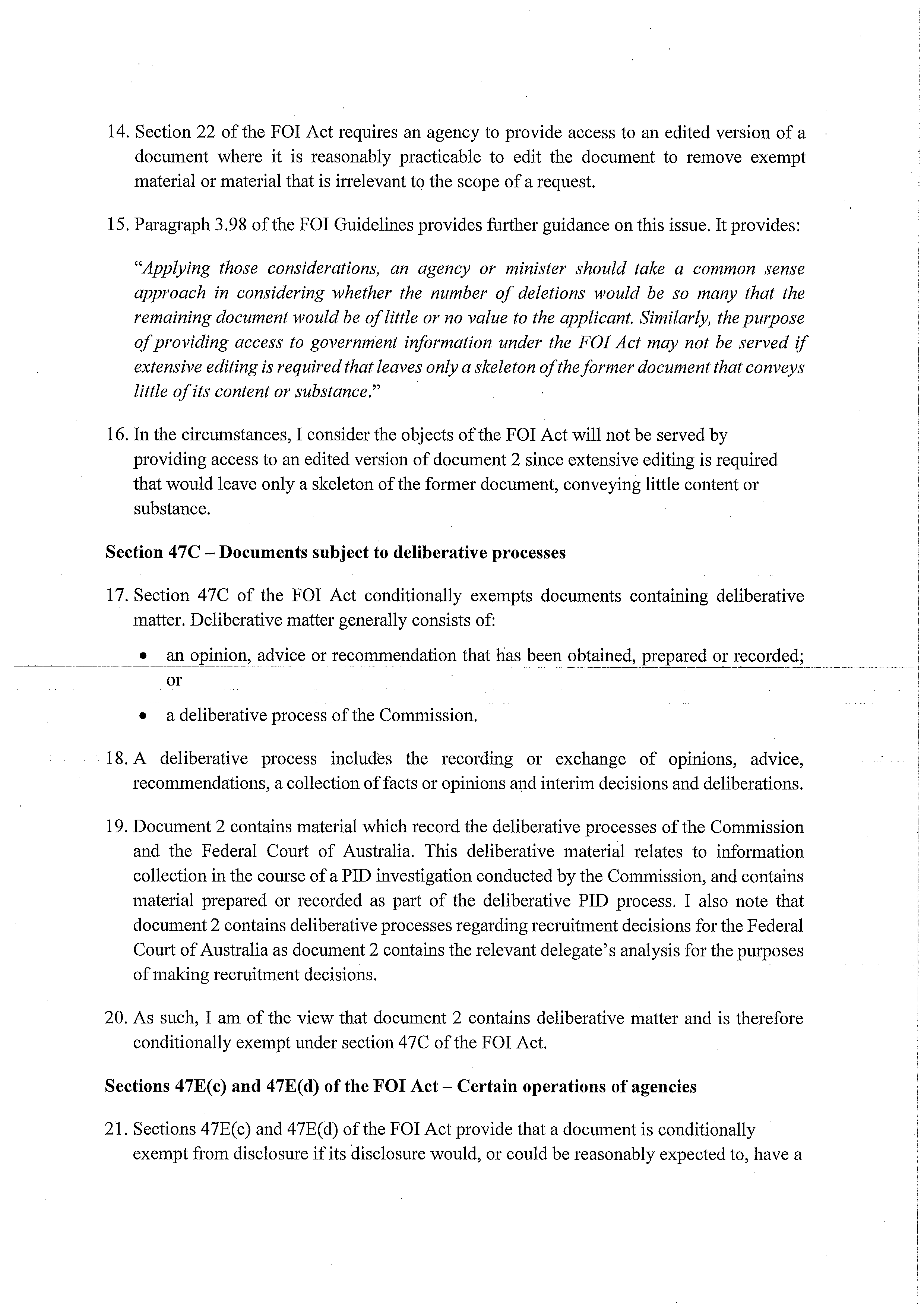
LEX 545
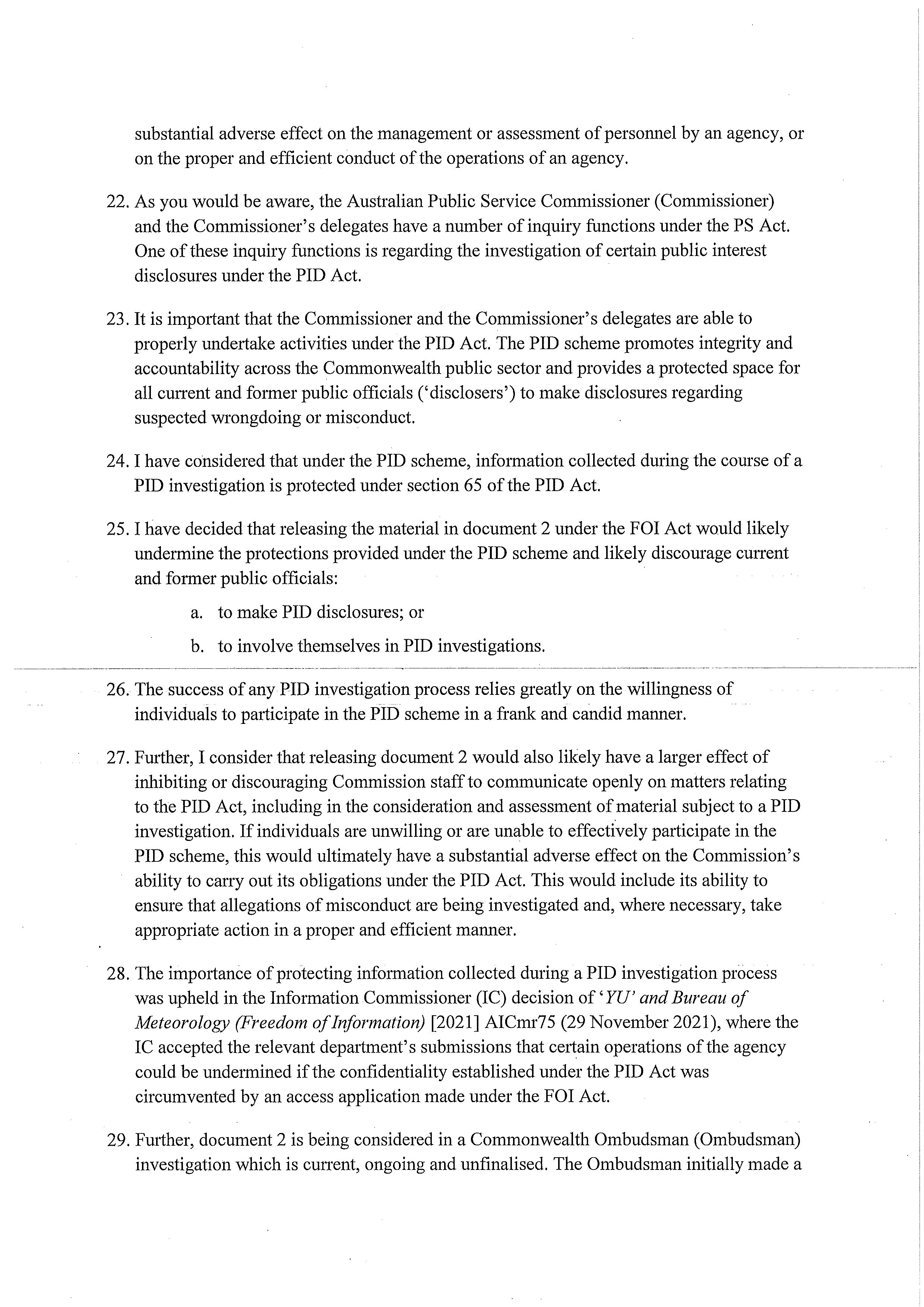
LEX 545
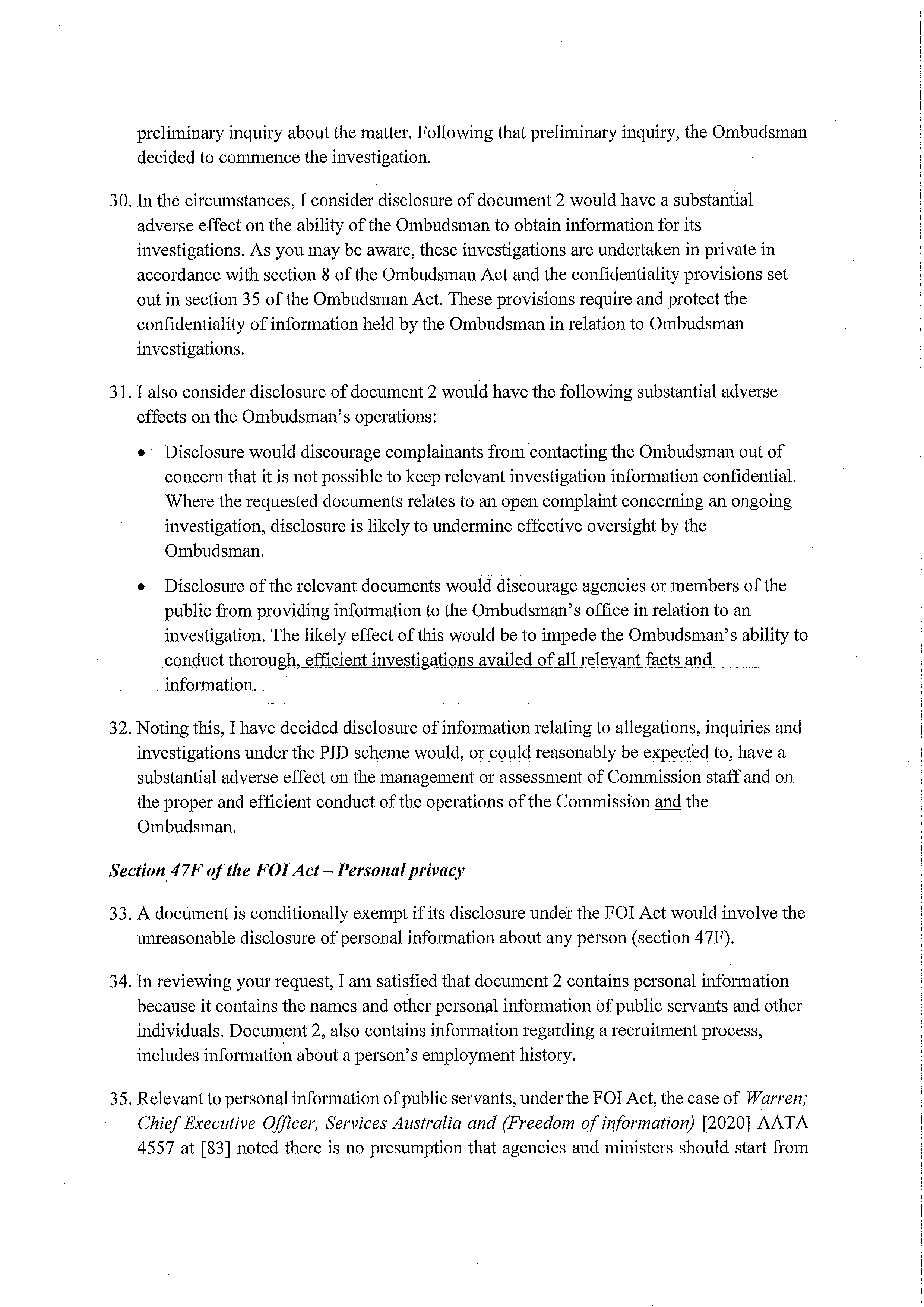
LEX 545
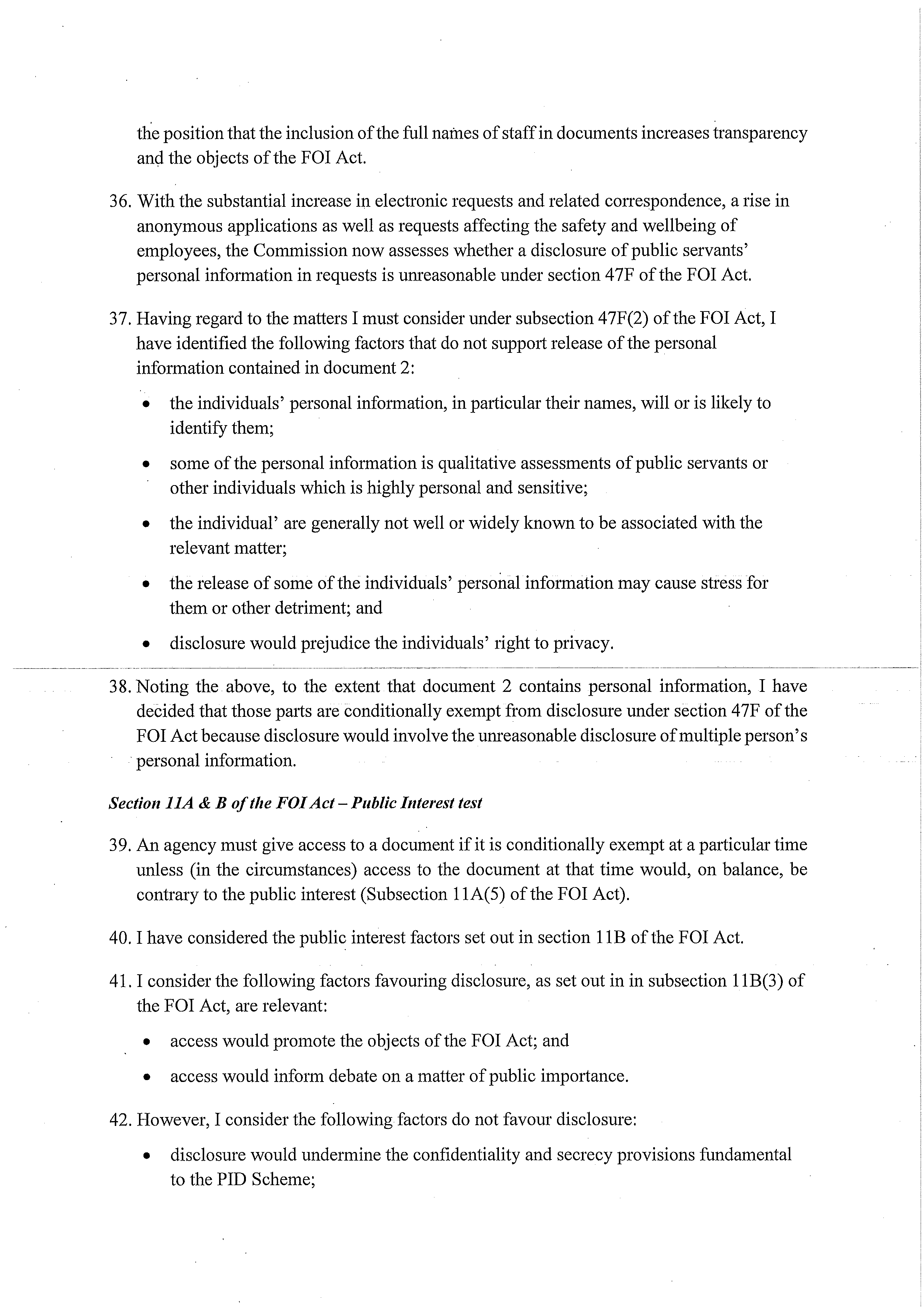
LEX 545
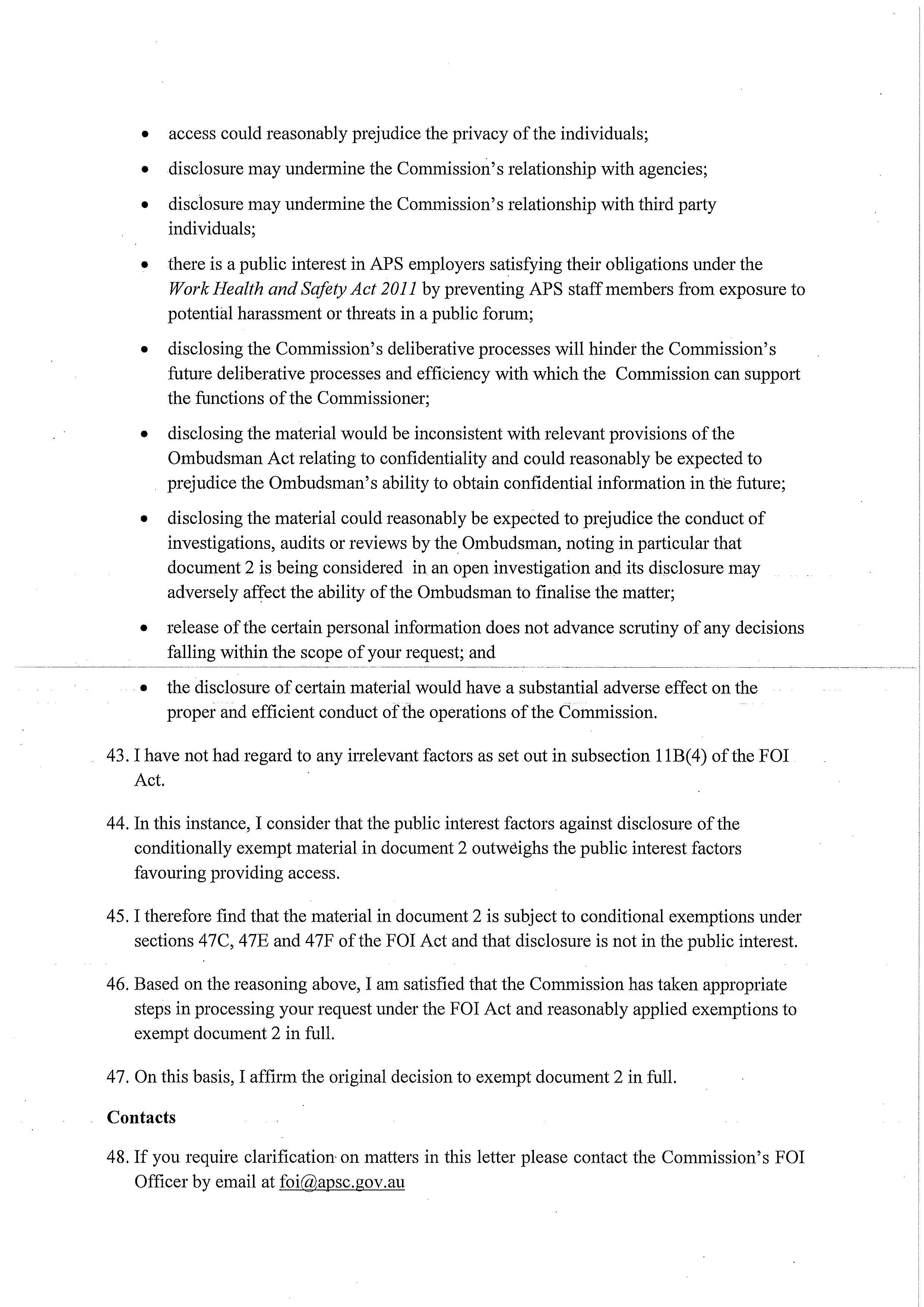
LEX 545
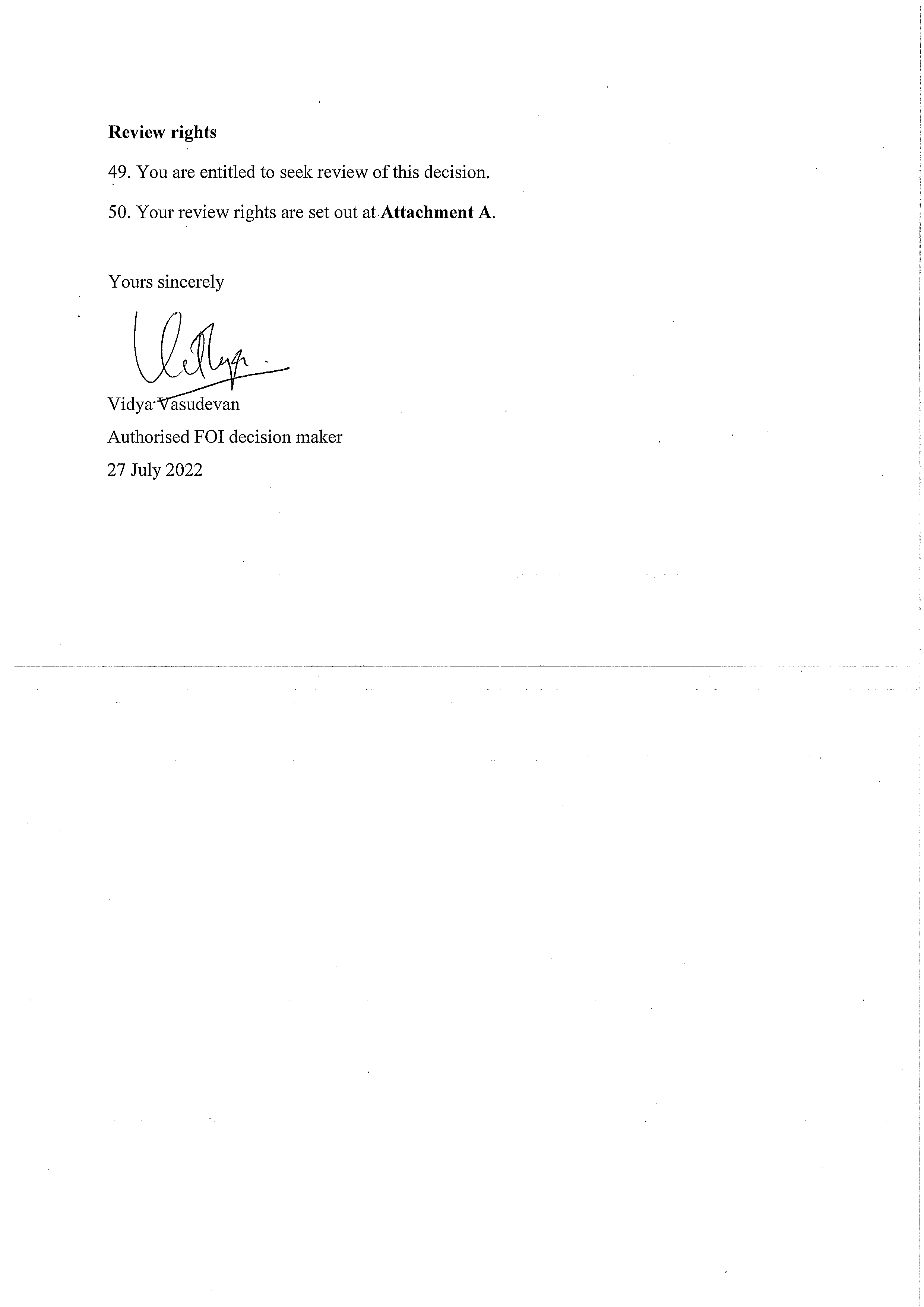
LEX 545
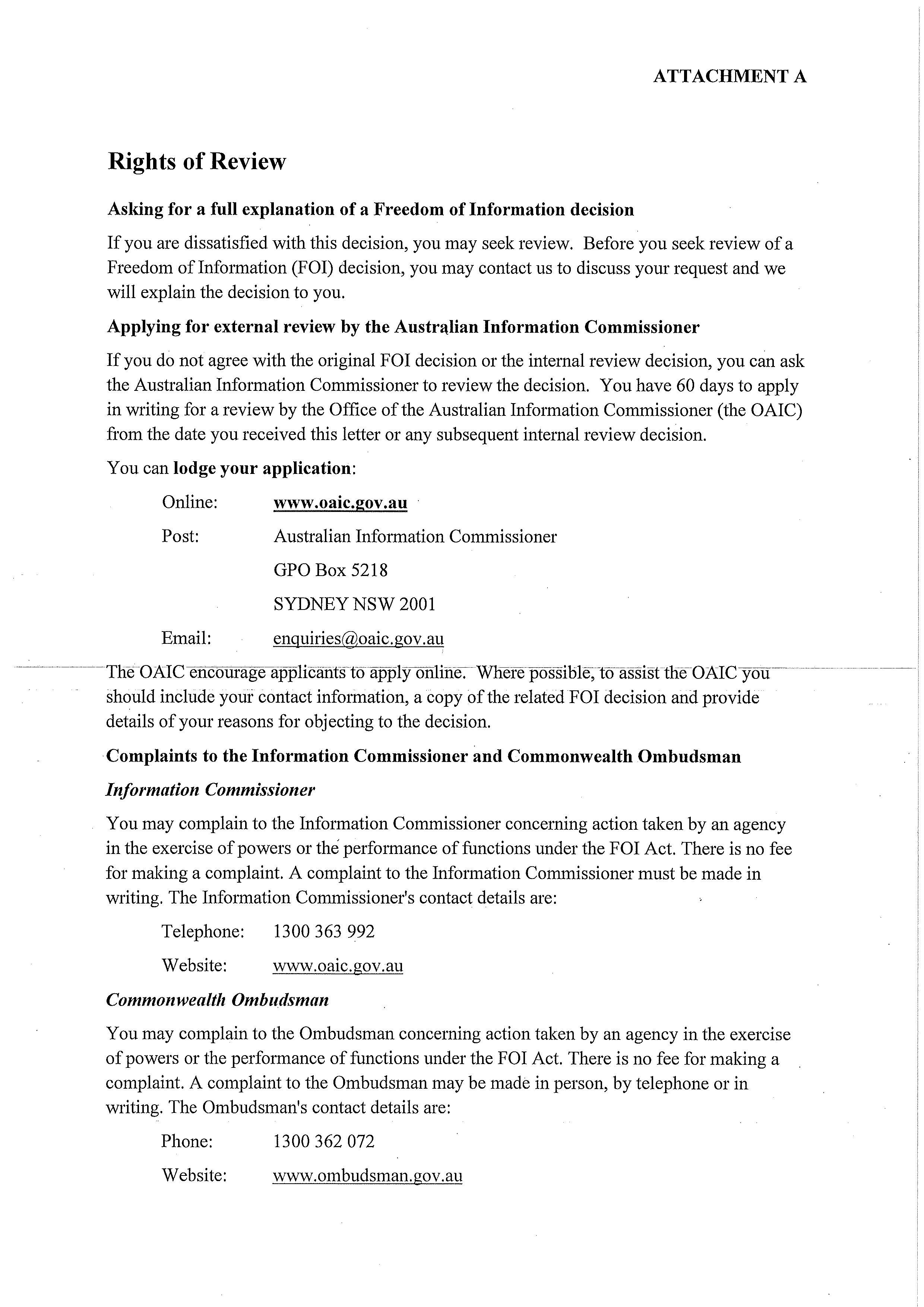
LEX 545
Document 7
LEX 545
FOI
From:
Marcus <xxxxxxxxxxxxxxxxxxxxxxxxx@xxxxxxxxxxx.xxx.xx>
Sent:
Wednesday, 15 June 2022 2:20 PM
To:
FOI
Subject:
Freedom of Information request - Disturbing but unsurprising revelations about
APSC PID investigation
Dear Australian Public Service Commission,
On 10 February 2022, an article was printed in The Australian. The title of the article was Top judge warned of
registrar overhaul.
According to the article:
a) “[Justice Greenwood] objected to plans to downgrade the classification that one existing registrar would be
appointed to – a decision the court’s chief executive and senior officials attempted to blame on the Australian Public
Service Commission.”
b) “Federal Court bureaucrats had circumvented the cap on the number of staff by hiring them at lower levels and
using special agreements to increase their pay – by up to $50,000 – and their titles.”
c) On 18 October 2018 Justice Greenwood wrote in an email:
i. “Warwick tells me that there is a problem because the (APSC) has a veto on any SES appointments.”
ii. “To solve the problem, Warwick wants to downgrade the role from an SES position, avoid the APSC’s veto and
appoint [Murray].”
d) “[Warwick] Soden had claimed that [Murray Belcher], a man who had been at the court for many years could not
be given the original Senior Executive Service classification advertised because it would be vetoed by the APSC
representative.”
e) Justice Greenwood noted that “Sia spoke to me briefly before she went on leave and apparently the (APSC)
representative was concerned that [Murray Belcher] was not very forthcoming about the changes to the
management system or otherwise he would make to improve the work of the court.”
1
LEX 545
f) Justice Greenwood noted “First, Warwick’s advice that the APSC has a veto on appointment is wrong.”
g) Justice Greenwood noted “The true position is that neither Warwick nor Sia want to appoint [Murray Belcher].
The so called ‘veto’ is a red herring to prevent [Murray Belcher] being awarded the position.”
h) Justice Greenwood noted that “The SES classification, you will find, will have been taken somewhere else in the
organisation …”
The issues highlighted in the article appear to have been the subject of a PID investigation that Ms Kate McMullan of
your office considered.
It appears that the following was recorded in Ms McMullan's report (https://www.righttoknow.org.au/request/r...
Findings
On the balance of probabilities, I find that this assertion about the Australian Public Service Commissioner’s
representative is not substantiated. On the basis of materials provided by the FCSA including a selection report, I
find that the outcome of the recruitment process was that Mr Belcher was found by the panel (including the
Australian Public Service Commissioner’s representative on the selection panel) to be the preferred candidate for
the advertised position. On the balance of probabilities, I find that no “veto power” was exercised or purported to
be exercised by the Australian Public Service Commissioner’s representative. On the balance of probabilities I find
that Mr Belcher was appointed to a[n] [Executive Level 2] position on the basis of a role review ...
In those circumstances, it is not clear whether or for what purpose Mr Soden may have made representations that
the Australian Public Service Commissioner’s representative had exercised a “veto power”; however, in absence of a
“veto power” being exercised or being purported to be exercised, any incorrect statement by Mr Soden (whether
due to a misstatement on Mr Soden’s behalf, a misunderstanding on Justice Greenwood’s behalf, a
miscommunication between the two, or for some other reason) about action taken by the Australian Public Service
Commissioner’s representative would not in and of itself constitute disclosable conduct. On that basis, I make no
further findings about any such comments that may have been made.
That is very concerning because it looks to me like Ms McMullan set out a series of conjectures and, on the basis of
those conjectures, made "no further findings about any such comments that may have been made". It looks to me
like Ms McMullan refused to properly engage in her role as investigator under the PID Act.
I certainly do not think that Justice Greenwood misunderstood anything based on what has been published in The
Australian.
2
LEX 545
Under the FOI Act I would like access to:
a) any and al correspondence between Kerryn Vine-Camp and Kate McMullan for the purposes of the PID
investigation Kate McMullan conducted;
b) any and all correspondence between Warwick Soden and Kate McMullan for the purposes of the PID investigation
Kate McMullan conducted;
c) any and all correspondence between Justice Greenwood and Kate McMullan for the purposes of the PID
investigation Kate McMullan conducted;
d) any and all documents exchanged between Kerryn Vine-Camp and Kate McMullan for the purposes of the PID
investigation Kate McMullan conducted;
e) any and all documents exchanged between Warwick Soden and Kate McMullan for the purposes of the PID
investigation Kate McMullan conducted;
f) any and all documents exchanged between Justice Greenwood and Kate McMullan for the purposes of the PID
investigation Kate McMullan conducted.
Yours faithfully,
Marcus
-------------------------------------------------------------------
Please use this email address for all replies to this request:
xxxxxxxxxxxxxxxxxxxxxxxxx@xxxxxxxxxxx.xxx.xx
Is xxx@xxxx.xxx.xx the wrong address for Freedom of Information requests to Australian Public Service
Commission? If so, please contact us using this form:
https://www.righttoknow.org.au/change_request/new?body=apsc
This request has been made by an individual using Right to Know. This message and any reply that you make will be
published on the internet. More information on how Right to Know works can be found at:
https://www.righttoknow.org.au/help/officers
3
LEX 545
Please note that in some cases publication of requests and responses will be delayed.
If you find this service useful as an FOI officer, please ask your web manager to link to us from your organisation's
FOI page.
-------------------------------------------------------------------
4

LEX 545
Document 8
Marcus
By ema
il: xxxxxxxxxxxxxxxxxxxxxxxxx@xxxxxxxxxxx.xxx.xx
Our reference: <SHC22-29057> <LEX 190>
Dear Marcus
Freedom of Information request
1. I am writing about your Freedom of Information (FOI) request under the
Freedom of
Information Act 1982 (FOI Act) made on 15 June 2022 for access to documents held by the
Australian Public Service Commission (Commission).
2. The FOI Act and all other Commonwealth legislation referred to in this letter are publicly
available from
www.legislation.gov.au
Documents relevant to your request
3. A copy of your original FOI request is attached.
Decision on your FOI request
4. I am authorised under subsection 23(1) of the FOI Act to make FOI decisions.
5. Subsection 24A(1) of the FOI Act provides that an agency may refuse a request for access
to a document if the agency is satisfied that all reasonable steps have been taken to find the
document and the agency is satisfied that the document does not exist.
6. I am satisfied that all reasonable steps have been taken to find any document relevant to
parts (a) – (f) of your request. Searches included retrieval of former employees’
correspondence by our ICT service provider, and examination of those results.
7. No documents were found. I have therefore decided to refuse your request for access under
section 24A of the FOI Act.
Contacts
8. If you require clarification on matters in this letter please contact the Commission’s FOI
Officer by telephone on (02) 6202 3500 or by email a
t xxx@xxxx.xxx.xx
Review rights
9. You are entitled to seek review of this decision. Your review rights are set out at
Attachment A.
B Block, Treasury Building
Parkes Place West PARKES ACT 2600
GPO Box 3176 CANBERRA ACT 2600

LEX 545
Yours sincerely
Giorgina Strangio
Authorised FOI decision maker
7 July 2022
LEX 545
ATTACHMENT A
Rights of Review
Asking for a full explanation of a Freedom of Information decision
If you are dissatisfied with this decision, you may seek review. Before you seek review of a
Freedom of Information (FOI) decision, you may contact us to discuss your request and we
will explain the decision to you.
Seeking review of a Freedom of Information decision
If you still believe a decision is incorrect, the
Freedom of Information Act 1982 (the FOI Act)
may give you the right to apply for a review of the decision. Under sections 54 and 54L of the
FOI Act, you can apply for a review of an FOI decision by seeking:
1. an internal review by an different officer of the Australian Public Service
Commission; and/or
2. external review by the Australian Information Commissioner.
There are no fees applied to either review option.
Applying for a review by an Internal Review Officer
If you apply for internal review, a different decision maker to the departmental delegate who
made the original decision will carry out the review. The Internal Review Officer will
consider all aspects of the original decision and decide whether it should change. An
application for internal review must be made in writing within 30 days of receiving this letter
to:
Email:
xxx@xxxx.xxx.xx
Post:
The FOI Officer
Australian Public Service Commission
B Block, Treasury Building
GPO Box 3176
Parkes Place West
PARKES ACT 2600
You do not need to fill in a form. However, it is a good idea to set out any relevant
submissions you would like the Internal Review Officer to further consider, and your reasons
for disagreeing with the decision.
Applying for external review by the Australian Information Commissioner
If you do not agree with the original FOI decision or the internal review decision, you can ask
the Australian Information Commissioner to review the decision. You have 60 days to apply
in writing for a review by the Office of the Australian Information Commissioner (the OAIC)
from the date you received this letter or any subsequent internal review decision.
LEX 545
You can
lodge your application:
Online:
www.oaic.gov.au
Post:
Australian Information Commissioner
GPO Box 5218
SYDNEY NSW 2001
Email:
xxxxxxxxx@xxxx.xxx.xx
The OAIC encourage applicants to apply online. Where possible, to assist the OAIC you
should include your contact information, a copy of the related FOI decision and provide
details of your reasons for objecting to the decision.
Complaints to the Information Commissioner and Commonwealth Ombudsman
Information Commissioner
You may complain to the Information Commissioner concerning action taken by an agency
in the exercise of powers or the performance of functions under the FOI Act. There is no fee
for making a complaint. A complaint to the Information Commissioner must be made in
writing. The Information Commissioner's contact details are:
Telephone:
1300 363 992
Website:
www.oaic.gov.au
Commonwealth Ombudsman
You may complain to the Ombudsman concerning action taken by an agency in the exercise
of powers or the performance of functions under the FOI Act. There is no fee for making a
complaint. A complaint to the Ombudsman may be made in person, by telephone or in
writing. The Ombudsman's contact details are:
Phone:
1300 362 072
Website:
www.ombudsman.gov.au
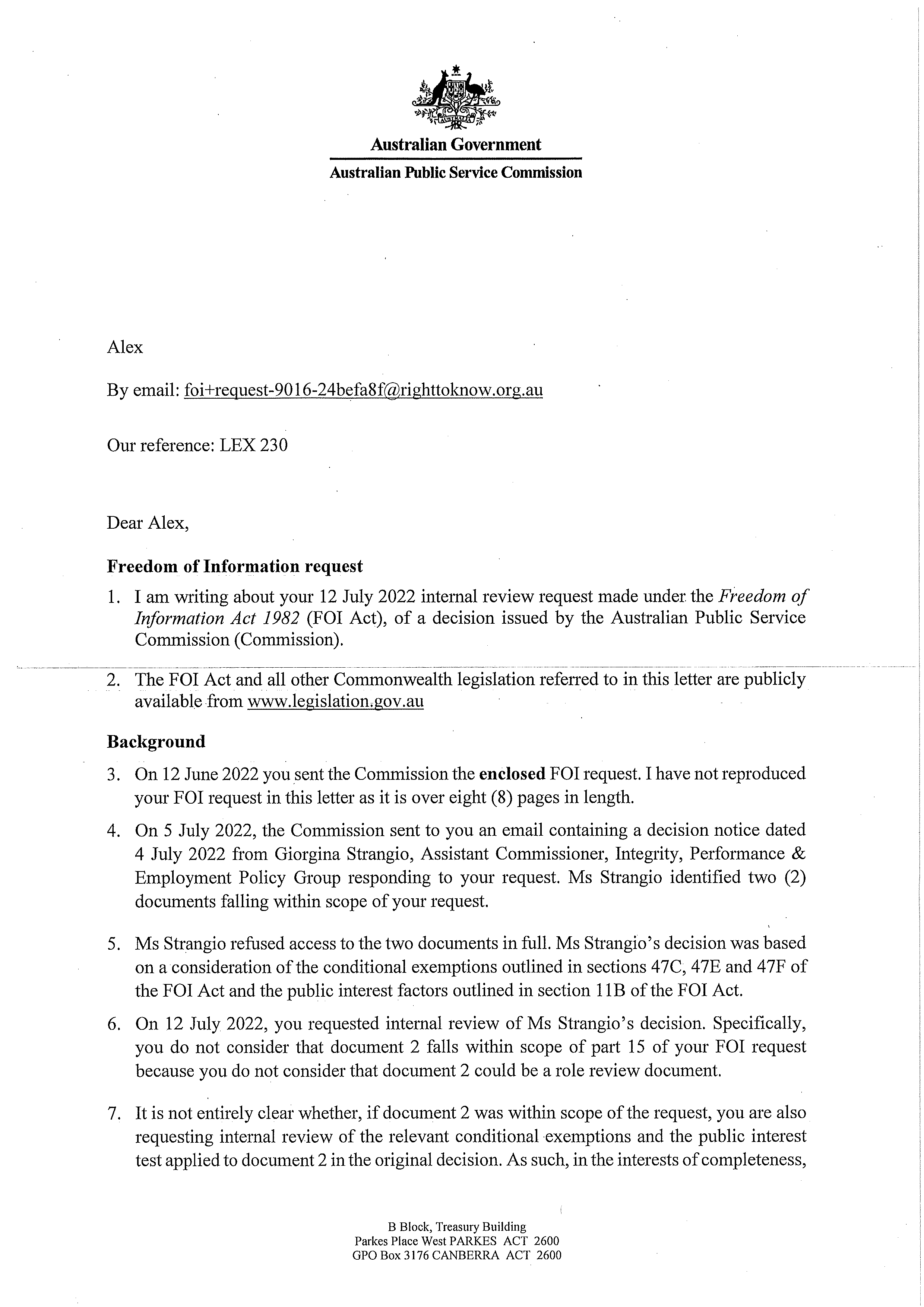
Document 9
LEX 546
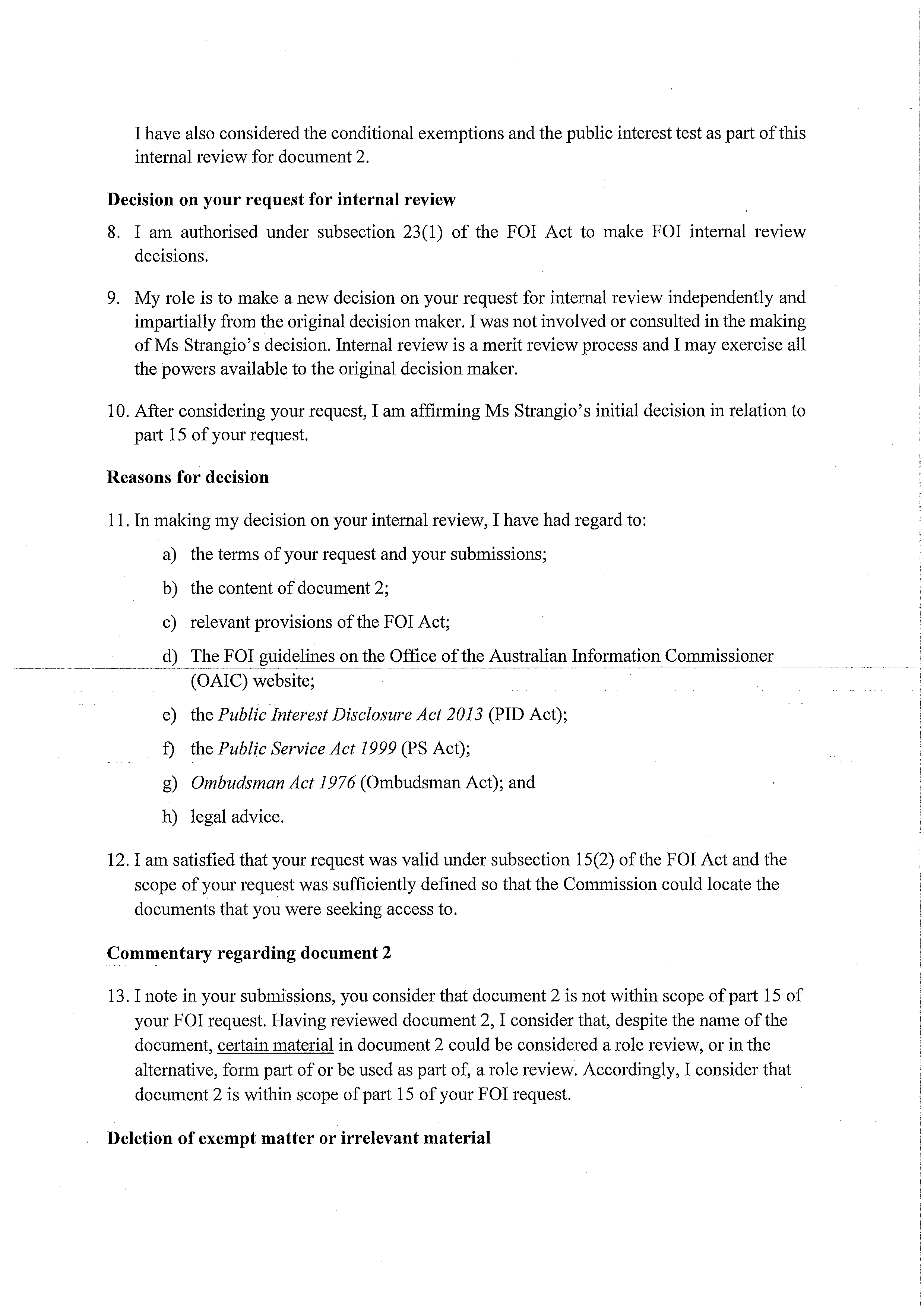
LEX 546
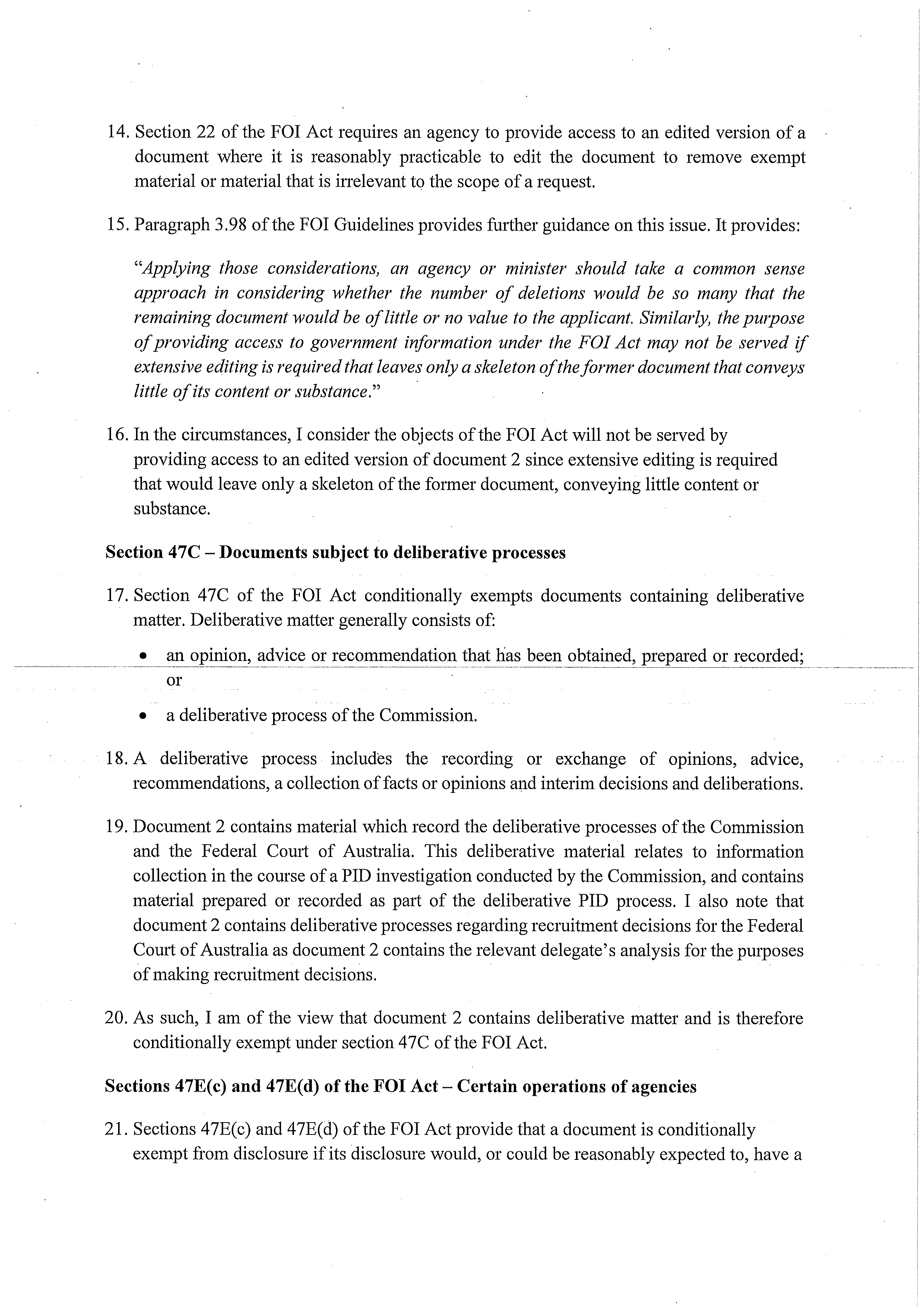
LEX 546
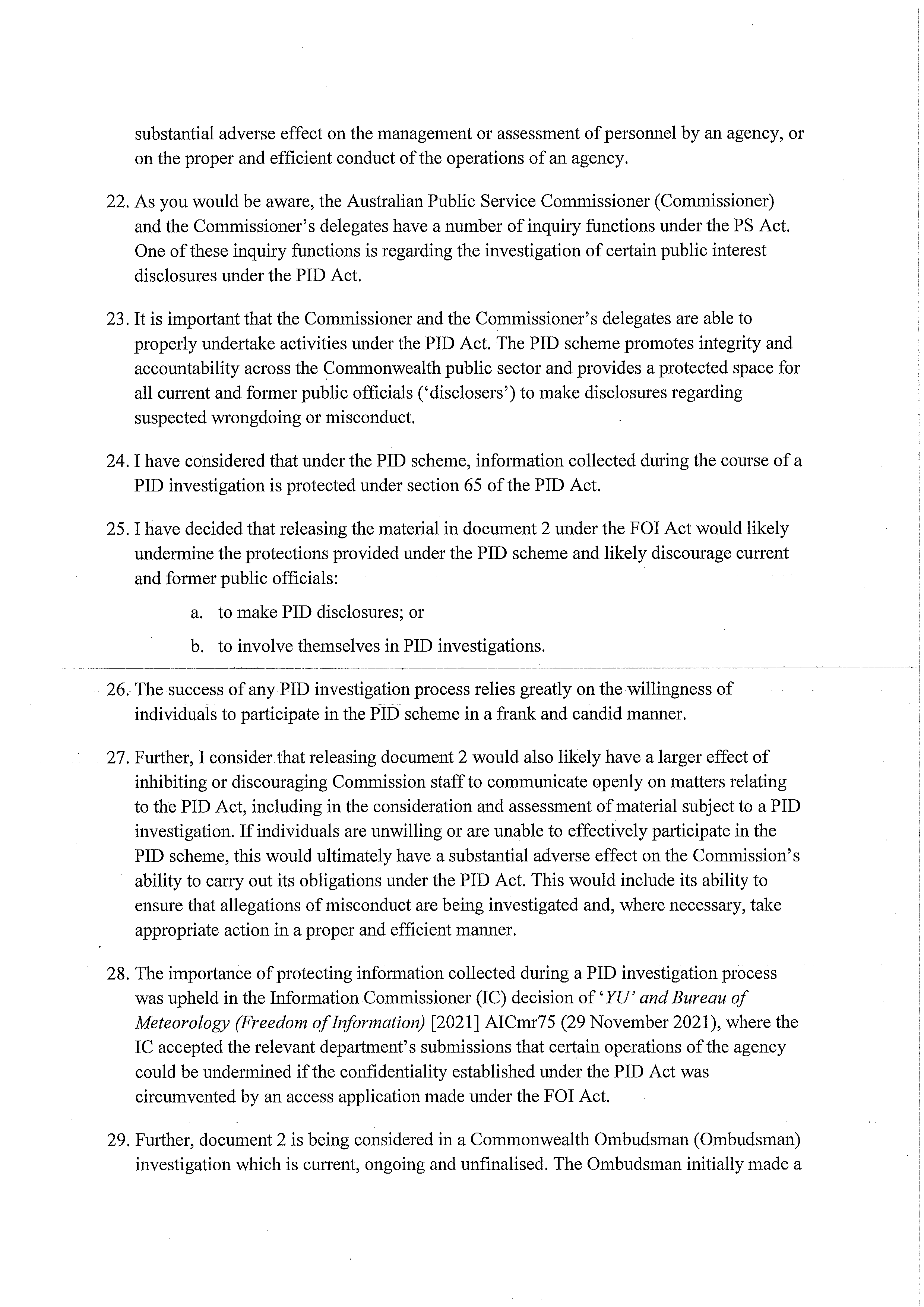
LEX 546
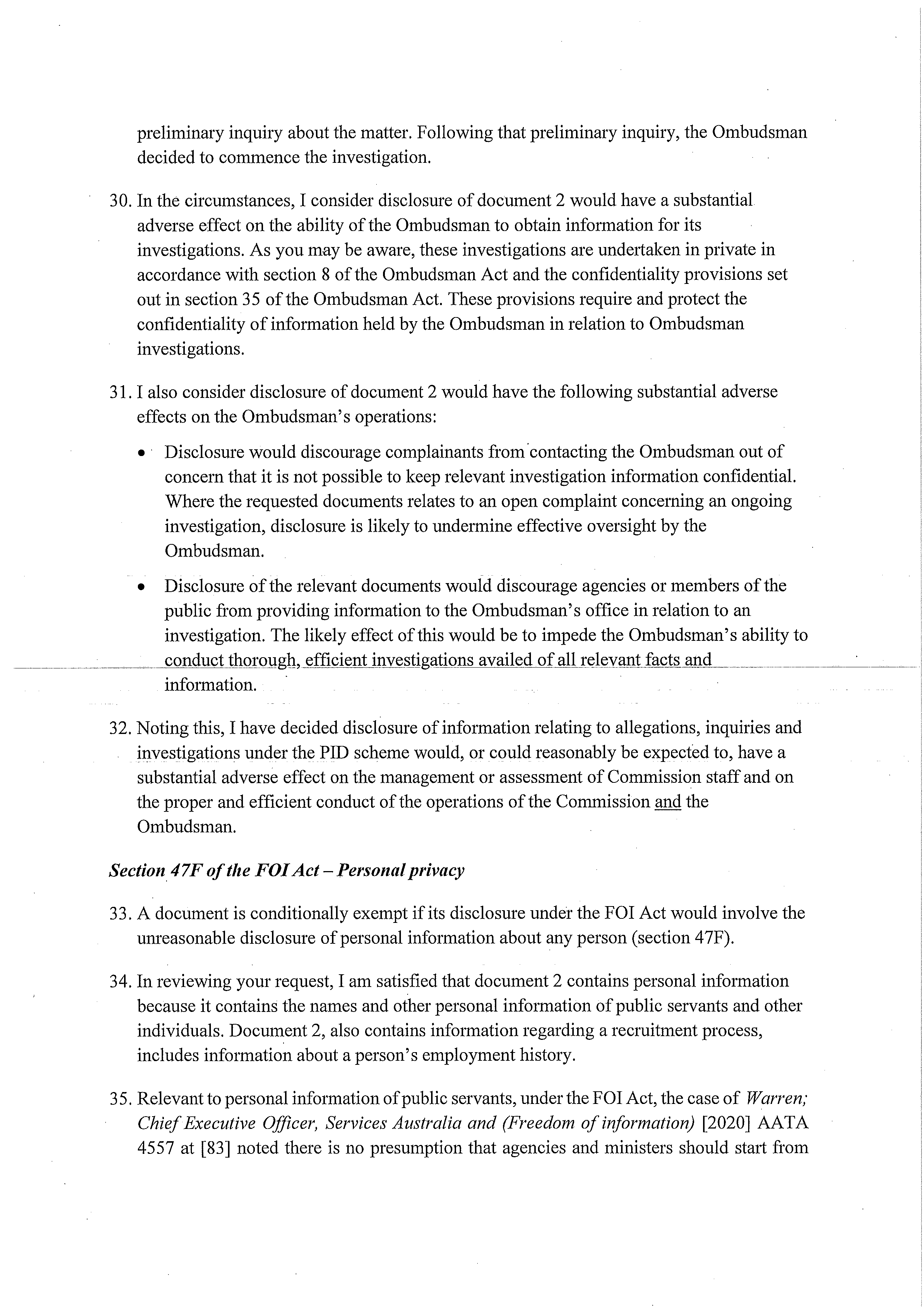
LEX 546
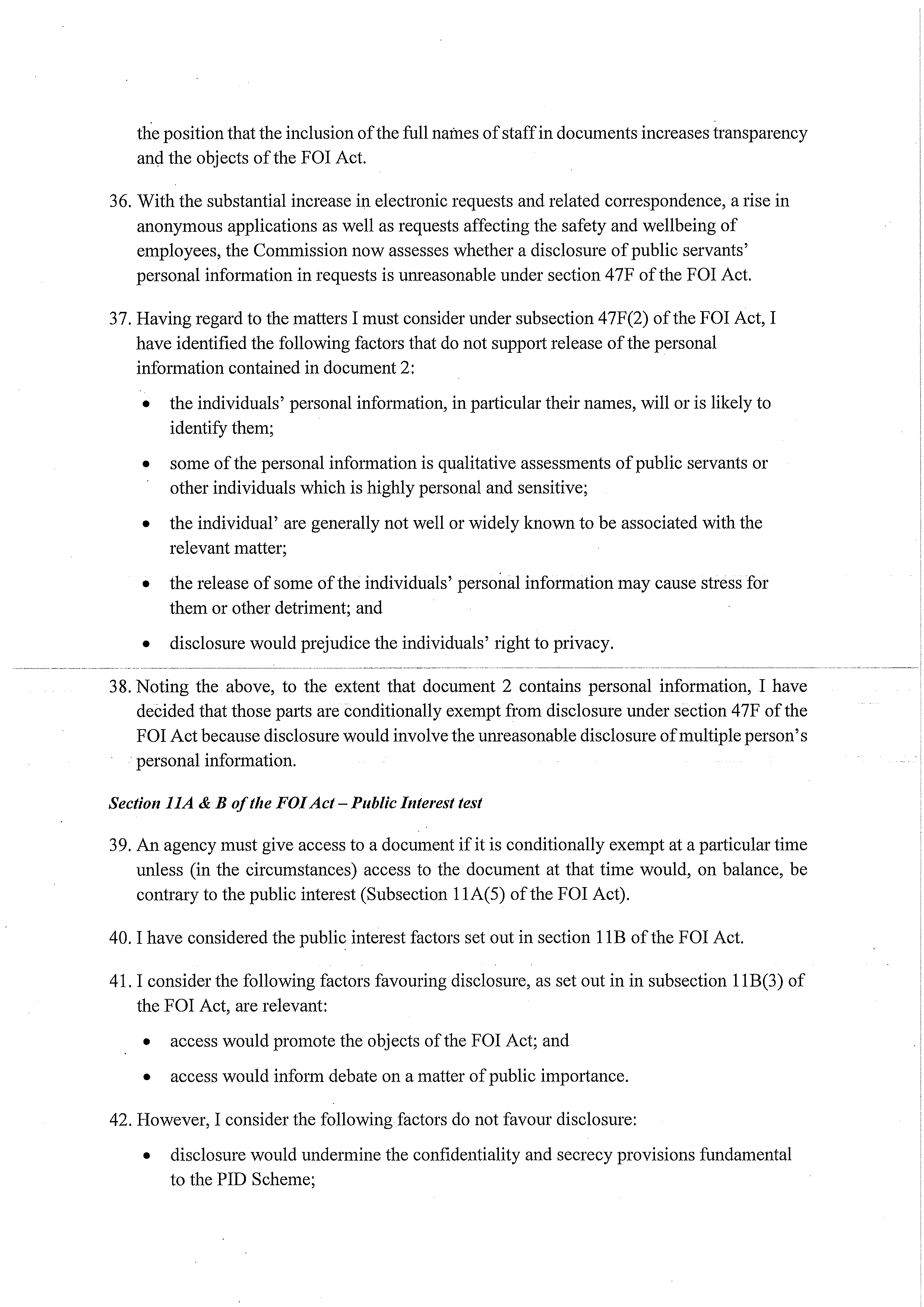
LEX 546
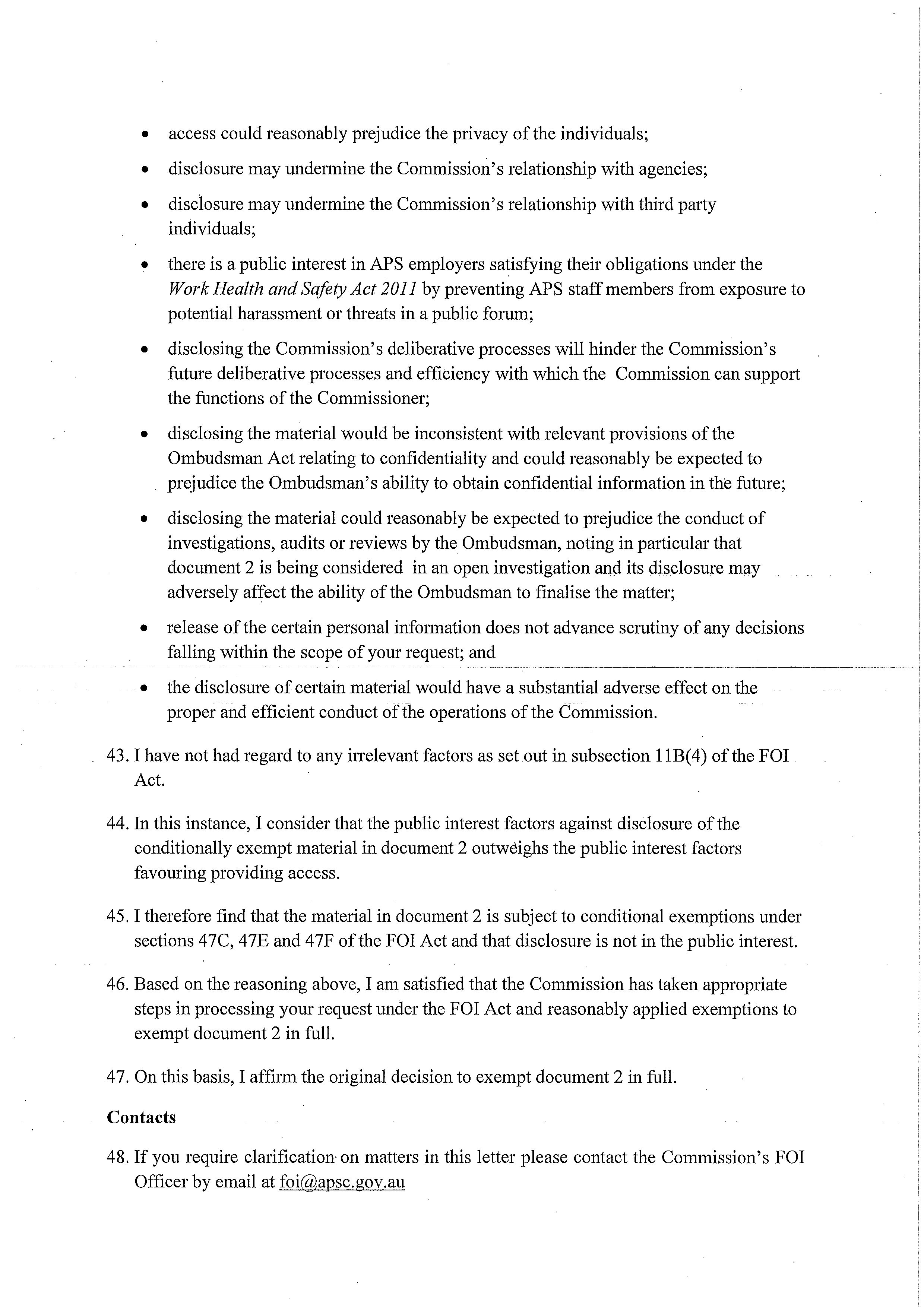
LEX 546
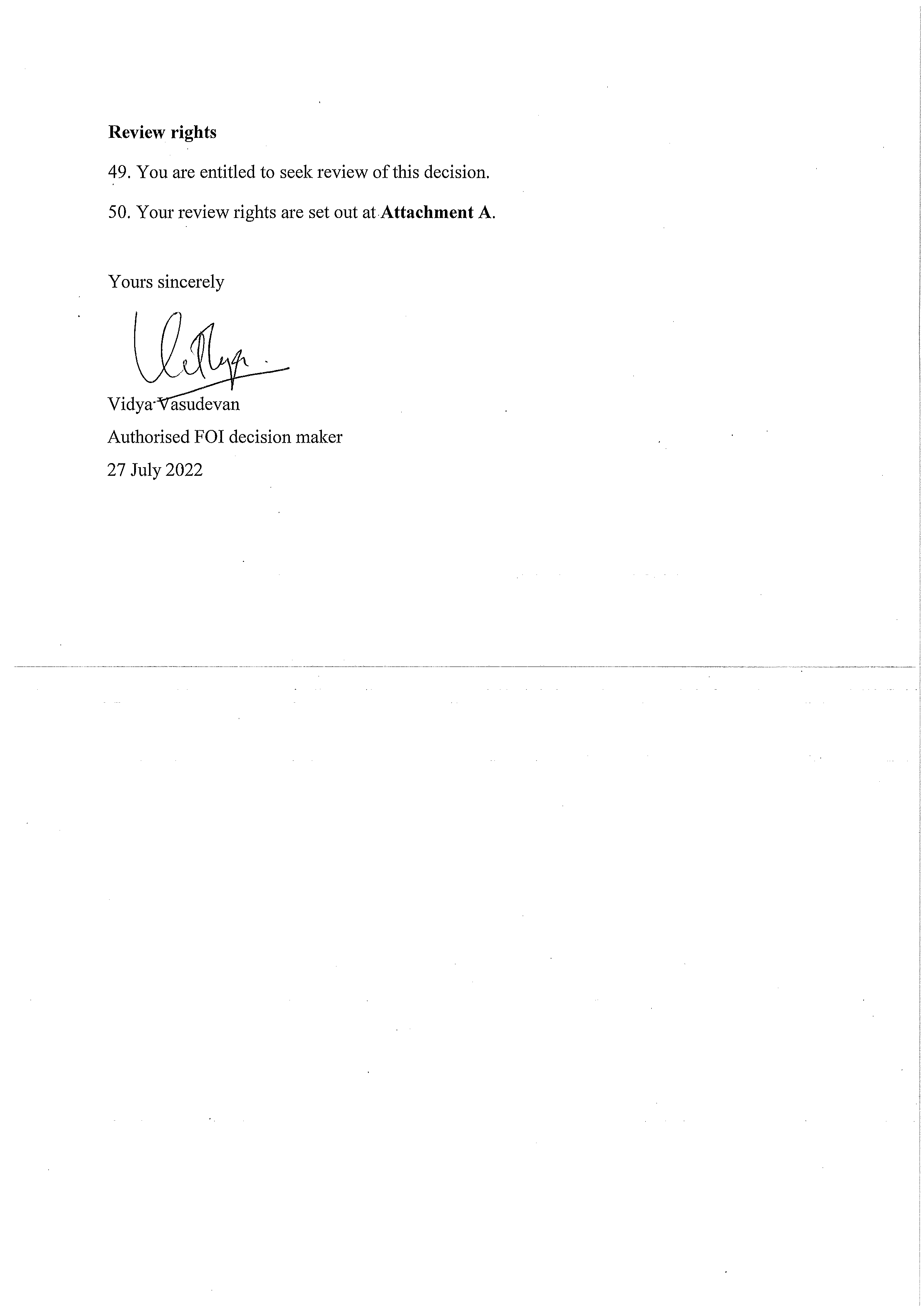
LEX 546
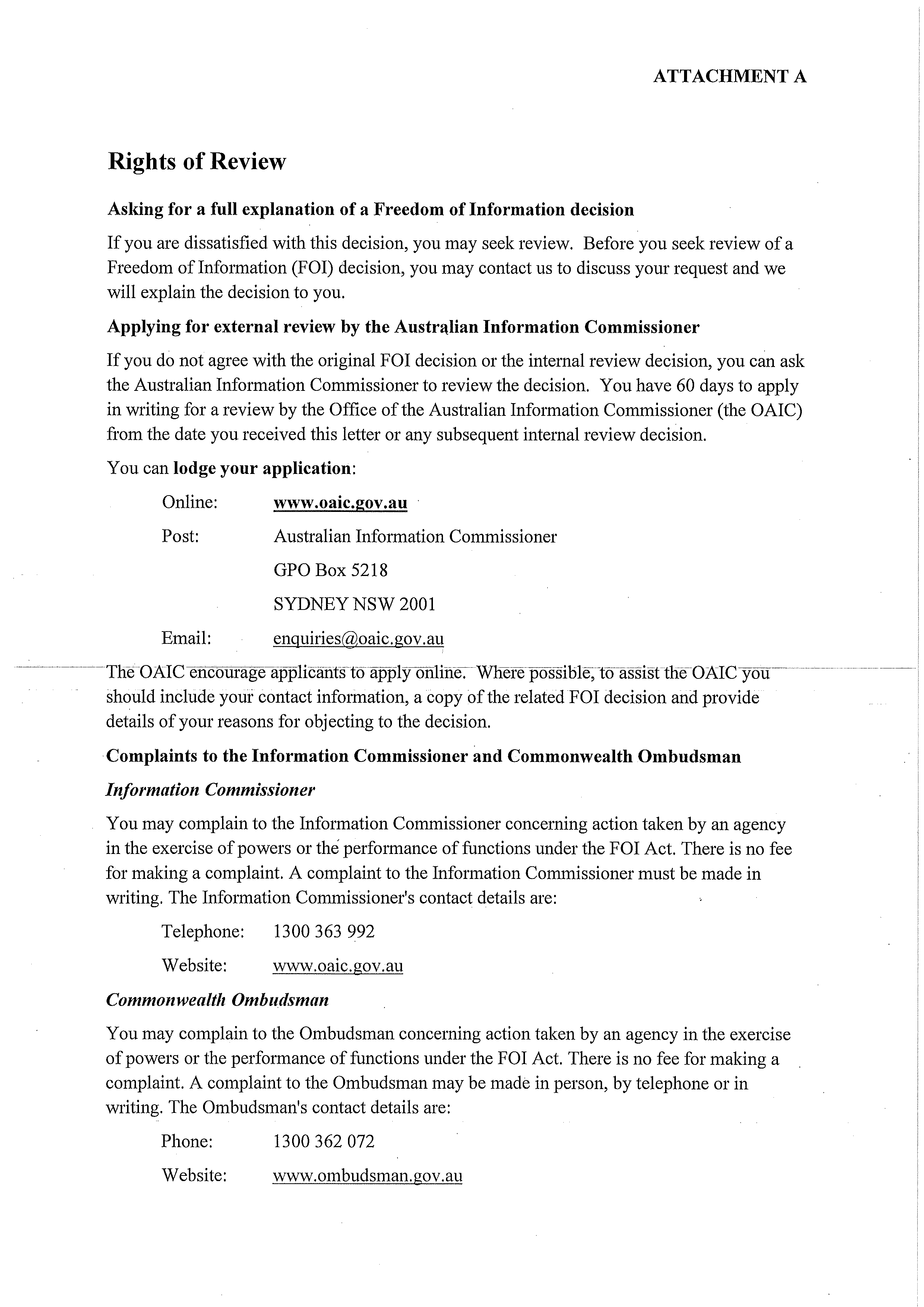
LEX 546

LEX 546
Document 10
“Alex”
By ema
il: xxxxxxxxxxxxxxxxxxxxxxxxx@xxxxxxxxxxx.xxx.xx
Our reference: <SHC22-28931><LEX187>
Dear “Alex”
Freedom of Information request
1. I am writing about your Freedom of Information (FOI) request under the
Freedom of
Information Act 1982 (FOI Act) made on 12 June 2022 for access to documents held by
the Australian Public Service Commission (Commission).
2. The FOI Act and all other Commonwealth legislation referred to in this letter are publicly
available from
www.legislation.gov.au
Documents relevant to your request
3. Your full request is enclosed.
4. I have identified two documents relevant to your request.
Decision
5. I am authorised under subsection 23(1) of the FOI Act to make FOI decisions.
6. For each part of your request I have decided:
Part 1
All reasonable steps have been taken to find any document relevant to Part 1 of
your request. I am satisfied that the documents either cannot be found or do not
exist. I refuse Part 1 of your request under section 24A of the FOI Act.
Part 2
All reasonable steps have been taken to find any document relevant to Part 2 of
your request. I am satisfied that the documents either cannot be found or do not
exist. I refuse Part 2 of your request under section 24A of the FOI Act.
Part 3
I have decided to refuse access to two documents (Documents 1 and 2) because
I consider they are exempt in full.
Attachment A sets out the grounds on which
the documents are exempt. My reasons are set out in
Attachment B.
B Block, Treasury Building
Parkes Place West PARKES ACT 2600
GPO Box 3176 CANBERRA ACT 2600
LEX 546
Part 4
All reasonable steps have been taken to find any document relevant to Part 4 of
your request. I am satisfied that the documents either cannot be found or do not
exist. I refuse Part 4 of your request under section 24A of the FOI Act.
Part 5
All reasonable steps have been taken to find any document relevant to Part 5 of
your request. I am satisfied that the documents either cannot be found or do not
exist. I refuse Part 5 of your request under section 24A of the FOI Act.
Part 6
All reasonable steps have been taken to find any document relevant to Part 6 of
your request. I am satisfied that the documents either cannot be found or do not
exist. I refuse Part 6 of your request under section 24A of the FOI Act.
Part 7 All reasonable steps have been taken to find any document relevant to Part 7
of your request. I am satisfied that the documents not exist. I refuse Part 7 of
your request under section 24A of the FOI Act.
Part 8 All reasonable steps have been taken to find any document relevant to Part 8
of your request. I am satisfied that the documents not exist. I refuse Part 8 of
your request under section 24A of the FOI Act.
Part 9
All reasonable steps have been taken to find any document relevant to Part 9
of your request. I am satisfied that the documents not exist. I refuse Part 9 of
your request under section 24A of the FOI Act.
Part
All reasonable steps have been taken to find any document relevant to Part 10
10
of your request. I am satisfied that the documents not exist. I refuse Part 10 of
your request under section 24A of the FOI Act.
Part
All reasonable steps have been taken to find any document relevant to Part 11
11
of your request. I am satisfied that the documents not exist. I refuse Part 11 of
your request under section 24A of the FOI Act.
Part
All reasonable steps have been taken to find any document relevant to Part 12
12
of your request. I am satisfied that the documents not exist. I refuse Part 12 of
your request under section 24A of the FOI Act.
Part
All reasonable steps have been taken to find any document relevant to Part 13
13
of your request. I am satisfied that the documents not exist. I refuse Part 13 of
your request under section 24A of the FOI Act.
Part
All reasonable steps have been taken to find any document relevant to Part 14
14
of your request. I am satisfied that the documents not exist. I refuse Part 14 of
your request under section 24A of the FOI Act.
Part
I have decided to refuse access to one document (Document 2) because I
15
consider it is exempt in full.
Attachment A sets out the grounds on which I
consider the document is exempt. My reasons are set out in
Attachment B.
Deletion of exempt matter or irrelevant material
7. Section 22 of the FOI Act requires an agency to provide access to an edited version of a
document where it is reasonably practicable to edit the document to remove exempt
material or material that is irrelevant to the scope of a request.

LEX 546
8. Relevant to deleting exempt or irrelevant content from a document, the FOI Guidelines
provide:
“3.98
Applying those considerations, an agency or minister should take a common sense
approach in considering whether the number of deletions would be so many that the
remaining document would be of little or no value to the applicant. Similarly, the purpose
of providing access to government information under the FOI Act may not be served if
extensive editing is required that leaves only a skeleton of the former document that conveys
little of its content or substance.”
9. I consider the objects of the FOI Act will not be served by providing access to an edited
version of the documents because extensive editing is required that would leave only a
skeleton of the former documents, conveying little content or substance.
Contacts
10. If you require clarification on matters in this letter please contact the Commission’s FOI
Officer by telephone on (02) 6202 3500 or by email a
t xxx@xxxx.xxx.xx
Review rights
11. You are entitled to seek review of this decision. Your review rights are set out at
Attachment C.
Yours sincerely
Giorgina Strangio
Authorised FOI decision maker
4 July 2022
LEX 546
ATTACHMENT A
SCHEDULE OF DOCUMENTS
D
ocument
Description
Grounds
Sections 22 (editing), 47C
(deliberative matter), 47E(c) and
1
Email correspondence between Commission and Federal Court of Australia titled 47E(d) (operations of an agency), and
“PRIVATE AND CONFIDENTIAL” dated 27 October 2020
47F (personal privacy) of the FOI Act
apply.
Sections 22 (editing and irrelevance),
Judicial Registrar Recruitment Outcome document prepared by Federal Court of
47C (deliberative matter), 47E(c) and
2
Australia
47E(d) (operations of an agency), and
47F (personal privacy) of the FOI Act
apply.
LEX 546
ATTACHMENT B
Reasons for decision
1. I have decided to refuse access to the documents in full because I have determined the
documents are exempt in full.
2. In making my decision I considered:
• the terms of your request;
• the contents of the document;
• the
Public Interest Disclosure Act 2013 (PID Act);
• the
Public Service Act 1999 (PS Act);
• the
Ombudsman Act 1976 (Ombudsman Act);
• the FOI Act;
• legal advice; and
• the FOI Guidelines issued by the Australian Information Commissioner.
Section 47C – Documents subject to deliberative processes
3. Section 47C of the FOI Act conditionally exempts documents containing deliberative
matter. Deliberative matter generally consists of:
• an opinion, advice or recommendation that has been obtained, prepared or recorded; or
• a deliberative process of the Commission.
4. A deliberative process includes the recording or exchange of opinions, advice,
recommendations, a collection of facts or opinions and interim decisions and deliberations.
5. The documents that fall within the scope of your request contain material which record the
deliberative processes of the Commission and the Federal Court of Australia. This
deliberative material relates to how the PID investigation was conducted by the
Commission, and contains material prepared or recorded as part of the deliberative PID
process.
6. For the reasons outlined above I am of the view that the documents contain deliberative
matter and parts are therefore conditionally exempt under section 47C of the FOI Act.
Sections 47E(c) and 47E(d) FOI Act – Certain operations of agencies
7. Sections 47E(c) and 47E(d) of the FOI Act provide that a document is conditionally
exempt from disclosure if its disclosure would, or could be reasonably expected to, have a
substantial adverse effect on the management or assessment of personnel by an agency, or
on the proper and efficient conduct of the operations of an agency.
8. The Australian Public Service Commissioner (Commissioner) and his delegates have a
number of inquiry functions under the PS Act, including in relation to the investigation of
certain public interest disclosures under the PID Act.
9. It is important that the Commissioner and his delegates are able to properly undertake
activities under the PID Act. The PID scheme promotes integrity and accountability
LEX 546
- 6 -
across the Commonwealth public sector and provides a protected space for all current and
former public officials (‘disclosers’) to make disclosures relating to suspected
wrongdoing or misconduct.
10. I have considered that under the PID scheme information collected during the course of a
PID investigation is protected under section 65 of the PID Act.
11. I have decided that release of material contained within the documents under the FOI Act
would likely undermine the protections provided under the PID scheme, and likely
discourage current and former public officials to make PID disclosures or to involve
themselves in PID investigations. The success of any PID investigation process relies
heavily on the willingness of individuals to participate in the PID scheme in a frank and
candid manner.
12. Further, I consider that the release of the documents would also likely have a larger effect
of inhibiting or discouraging Commission staff to freely and effectively communicate on
matters relating to the PID Act, including in the consideration and assessment of material
subject to a PID investigation. Should individuals be unwilling or unable to effectively
participate in the PID scheme, this would ultimately have a substantial adverse effect on
the Commission’s ability to carry out its obligations under the PID Act, including its
ability to ensure that allegations of misconduct are being investigated and where
necessary take appropriate action in a proper and efficient manner.
13. I note that the importance of protecting information collected during a PID investigation
process was upheld in the recent Information Commissioner (IC) decision of ‘
YU’ and
Bureau of Meteorology (Freedom of Information) [2021] AICmr75 (29 November 2021),
where the IC accepted the relevant department’s submissions that certain operations of
the agency could be undermined if the confidentiality established under the PID Act was
circumvented by an access application made under the FOI Act.
14. I consider release of the information in the document would jeopardise the confidentiality
regime established by the
Public Interest Disclosure Act 2013. There is no legislative or
regulatory regime that requires the disclosure of the document requested. Rather, disclosure
of the information would likely breach the Commission’s privacy and confidentiality
obligations under the Commonwealth Public Interest Disclosure scheme.
15. Further, the documents are documents being considered in a Commonwealth Ombudsman
(Ombudsman) investigation which is current, ongoing and unfinalised. The Ombudsman
initially made a preliminary inquiry about the matter, and subsequently decided to
commence the investigation.
16. I consider disclosure of documents would have a substantial adverse effect on the ability
of the Ombudsman to obtain information for its investigations, which are undertaken in
private in accordance with section 8 of the Ombudsman Act and the confidentiality
provisions set out in section 35 of the Ombudsman Act. These provisions require and
protect the confidentiality of information held by the Ombudsman in relation to
Ombudsman investigations.
17. I also consider disclosure of the documents would have the following substantial adverse
effects on the Ombudsman’s operations:
LEX 546
- 7 -
• Disclosure would discourage complainants from contacting the Ombudsman out of
concern that it is not possible to keep relevant investigation information confidential.
Where the requested document relates to an open complaint concerning an ongoing
investigation, disclosure is likely to undermine effective oversight by the
Ombudsman.
• Disclosure of the relevant document would discourage agencies or members of the
public from providing information to the Ombudsman’s office in relation to an
investigation. The likely effect of this would be to impede the Ombudsman’s ability to
conduct thorough, efficient investigations availed of all relevant facts and
information.
18. I have therefore decided disclosure of information relating to allegations, inquiries and
investigations under the PID scheme and under the Ombudsman Act would, or could
reasonably be expected to, have a substantial adverse effect on the management or
assessment of public servants and on the proper and efficient conduct of the operations of
the Commission and the Ombudsman.
Section 47F – personal information
19. Section 47F of the FOI Act provides that a document is conditionally exempt if it would
involve the unreasonable disclosure of personal information about any person.
20. Personal information means information or an opinion about an identified individual, or an
individual who is reasonably identifiable whether:
• the information or opinion is true or not; and
• the information or opinion is recorded in a material form or not.
21. The document contains the names and other personal information of public servants and
other individuals, including information about their qualifications and employment
history.
22. I have had regard to the matters I must consider under subsection 47F(2) of the FOI Act in
determining whether the disclosure of the documents would involve the unreasonable
disclosure of personal information.
23. Relevant to personal information of public servants, under the FOI Act there is no
presumption that agencies and ministers should start from the position that the inclusion of
the full names of staff in documents increases transparency and the objects of the FOI Act:
Warren; Chief Executive Officer, Services Australia and (Freedom of information) [2020]
AATA 4557 at [83].
24. With the substantial increase in electronic requests and related correspondence, a rise in
anonymous applications as well as requests affecting the safety and wellbeing of
employees, the Commission assesses whether a disclosure of public servants’ personal
information in requests is unreasonable under section 47F of the FOI Act.
LEX 546
- 8 -
25. I have identified the following factors that, in my view, do not support release of certain
public servants’ personal information under section 47F of the FOI Act:
• the individuals’ personal information, in particular their names, will or may identify
them;
• the individuals’ are generally not well or widely known to be associated with the
relevant matter;
• some of the personal information is qualitative assessments of public servants or other
individuals which is extremely personal and sensitive;
• the release of some of the individuals’ personal information may cause stress for them
or other detriment; and
• disclosure would prejudice the individuals’ right to privacy.
26. The level of personal information published in media articles by
The Australian and on the
Right to Know website may cause the concerned persons harm and distress. Due to the
level of attention brought about by the articles disclosure of any personal information could
reasonably be expected to interfere with the privacy of individuals. It follows I consider it
would be unreasonable to disclose the personal information in the document given it is
highly likely to lead to further harm and distress for those people and others.
27. I have therefore decided to the extent that the documents include personal information,
those parts are conditionally exempt from disclosure under section 47F of the FOI Act
because disclosure would involve the unreasonable disclosure of multiple persons’ personal
information.
Section 11A – public interest test
28. Subsection 11A(5) of the FOI Act provides that an agency must give access to a document
if it is conditionally exempt unless access to the document would, on balance, be contrary
to the public interest.
29. I have considered the public interest exemption factors in favour of disclosure at subsection
11B(3) of the FOI Act, including the extent to which access to the document would promote
the objects of the FOI Act and inform debate on a matter of public importance.
30. I have identified the following factors as weighing against disclosure:
• disclosure of certain personal information will not advance any scrutiny of any
decisions falling within the scope of your FOI request;
• disclosure would prejudice the individuals’ right to privacy;
• APS employers must fulfil their obligations under the
Work Health and Safety Act 2011,
in particular by preventing the exposure of staff members from potential harassment or
threats in a public forum;
• disclosure would undermine the confidentiality and secrecy provisions fundamental to
the PID Scheme;
• the disclosure of the Commission’s deliberative processes will hinder the
Commission’s future deliberative processes and efficiency with which the Commission
can support the functions of the Commissioner;
• the disclosure of certain information have a substantial adverse effect on the proper and
efficient conduct of the operations of the Commission;
LEX 546
- 9 -
• disclosure may undermine the Commission’s relationship with agencies and third party
individuals;
• disclosure could reasonably be expected to prejudice the conduct of investigations,
audits or reviews by the Ombudsman or Auditor-General, noting in particular that the
documents are being considered in an open investigation and its disclosure may
adversely affect the ability of the Ombudsman to finalise the matter; and
• disclosure would be inconsistent with relevant provisions of the Ombudsman Act
relating to confidentiality and could reasonably be expected to prejudice the
Ombudsman’s ability to obtain confidential information in the future.
31. Subsection 11B(4) of the FOI Act lists factors that are irrelevant to determining whether
access would be in the public interest. I have not considered these factors.
32. The oversight of the Commonwealth Public Interest Disclosure scheme is a responsibility
of the Commonwealth Ombudsman. I do not consider the information in the documents
would be of serious concern or benefit to the public. In my view, it would merely satisfy
the curiosity of others, which is not a consideration of the public interest test.
33. On balance, I find disclosure of parts of the documents would be contrary to the public
interest. To the extent the material contained in the documents is conditionally exempt
under 47C, 47E and 47F of the FOI Act, the material is exempt from disclosure in full.
LEX 546
Rights of Review
Asking for a full explanation of a Freedom of Information decision
If you are dissatisfied with this decision, you may seek review. Before you seek review of a
Freedom of Information (FOI) decision, you may contact us to discuss your request and we
will explain the decision to you.
Seeking review of a Freedom of Information decision
If you still believe a decision is incorrect, the
Freedom of Information Act 1982 (the FOI Act)
you may be able to apply for a review of the decision. Under sections 54 and 54L of the FOI
Act, you can apply for a review of an FOI decision by seeking:
1. an internal review by an different officer of the Australian Public Service
Commission; and/or
2. external review by the Australian Information Commissioner.
There are no fees applied to either review option.
Applying for a review by an Internal Review Officer
If you apply for internal review, a different decision maker to the departmental delegate who
made the original decision will carry out the review. The Internal Review Officer will
consider all aspects of the original decision and decide whether it should change. An
application for internal review must be made in writing within 30 days of receiving this letter
to:
Email:
xxx@xxxx.xxx.xx
Post:
The FOI Officer
Australian Public Service Commission
B Block, Treasury Building
GPO Box 3176
Parkes Place West
PARKES ACT 2600
You do not need to fill in a form. However, it is a good idea to set out any relevant
submissions you would like the Internal Review Officer to further consider, and your reasons
for disagreeing with the decision.
Applying for external review by the Australian Information Commissioner
If you do not agree with the original FOI decision or the internal review decision, you can ask
the Australian Information Commissioner to review the decision. You have 60 days to apply
in writing for a review by the Office of the Australian Information Commissioner (the OAIC)
from the date you received this letter or any subsequent internal review decision.
You can
lodge your application:
LEX 546
Online:
www.oaic.gov.au
Post:
Australian Information Commissioner
GPO Box 5218
SYDNEY NSW 2001
Email:
xxxxxxxxx@xxxx.xxx.xx
The OAIC encourage applicants to apply online. Where possible, to assist the OAIC you
should include your contact information, a copy of the related FOI decision and provide
details of your reasons for objecting to the decision.
Complaints to the Information Commissioner and Commonwealth Ombudsman
Information Commissioner
You may complain to the Information Commissioner concerning action taken by an agency
in the exercise of powers or the performance of functions under the FOI Act. There is no fee
for making a complaint. A complaint to the Information Commissioner must be made in
writing. The Information Commissioner's contact details are:
Telephone:
1300 363 992
Website:
www.oaic.gov.au
Commonwealth Ombudsman
You may complain to the Ombudsman concerning action taken by an agency in the exercise
of powers or the performance of functions under the FOI Act. There is no fee for making a
complaint. A complaint to the Ombudsman may be made in person, by telephone or in
writing. The Ombudsman's contact details are:
Phone:
1300 362 072
Website:
www.ombudsman.gov.au
Document Outline



























